Week 209: Matilda is on the hard
An epic voyage (for me anyway) crossing from Lesvos to Athens over a couple of days as we finally relocate Matilda, then back to Belgium and Gent with Karina.
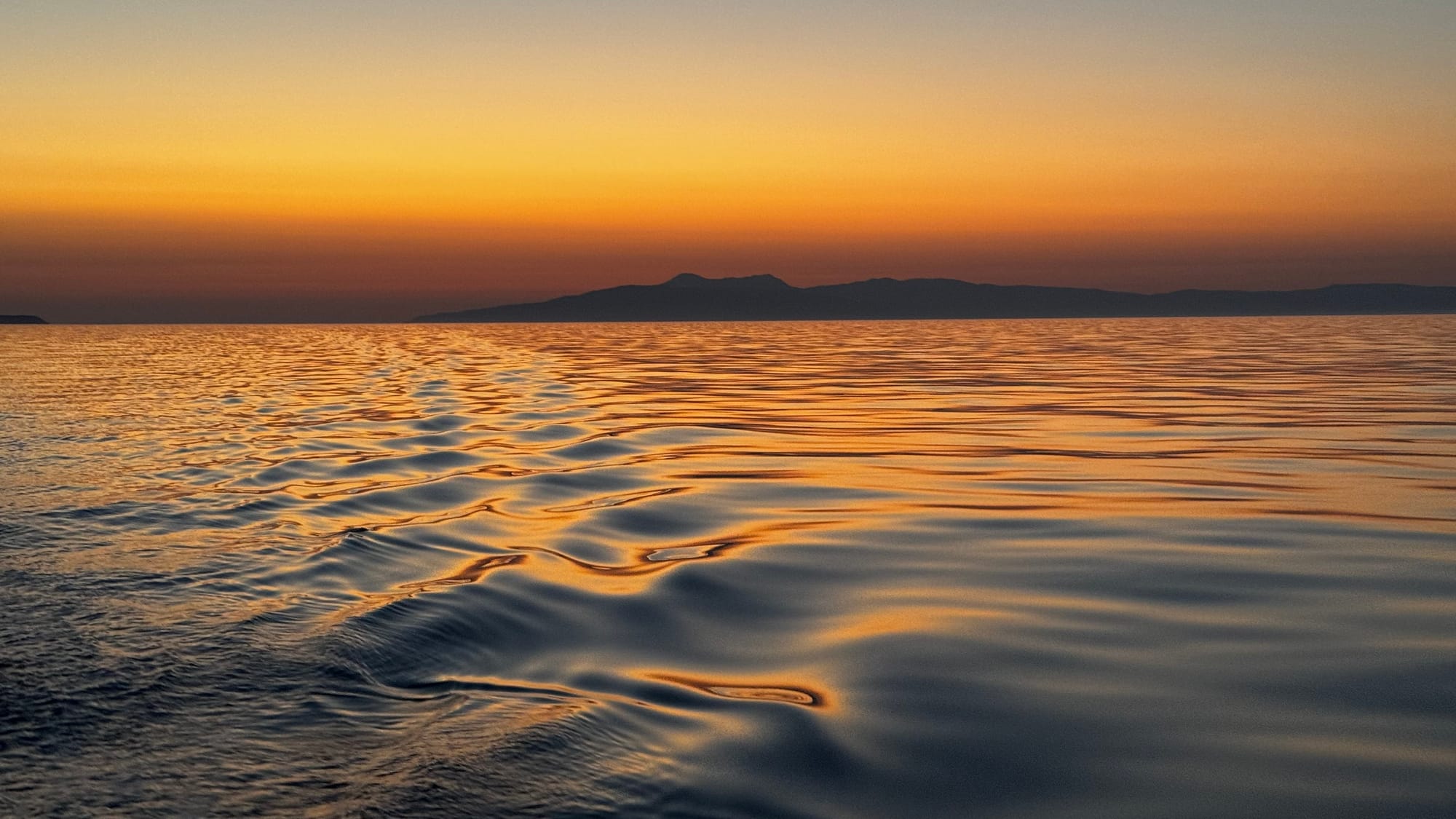
It's been a crazy week.
I finished last week wanting to start the sea trial, which I did and promptly failed. Despite the mechanic replacing the fuel filter with an official one the day before, the same problem occurred again. Diesel started pouring from the generator's fuel filter AGAIN when the engines started.
Hang on. When the engines started, the generator fuel filter leaked. I stopped and remembered the last few times we had the issue. Was that something consistent? Maybe. There was that time when the fuel return line burst on the starboard engine, spraying diesel. Then that was repaired, and the generator leaked again. A series of facts started to line up, and a new hypothesis formed.
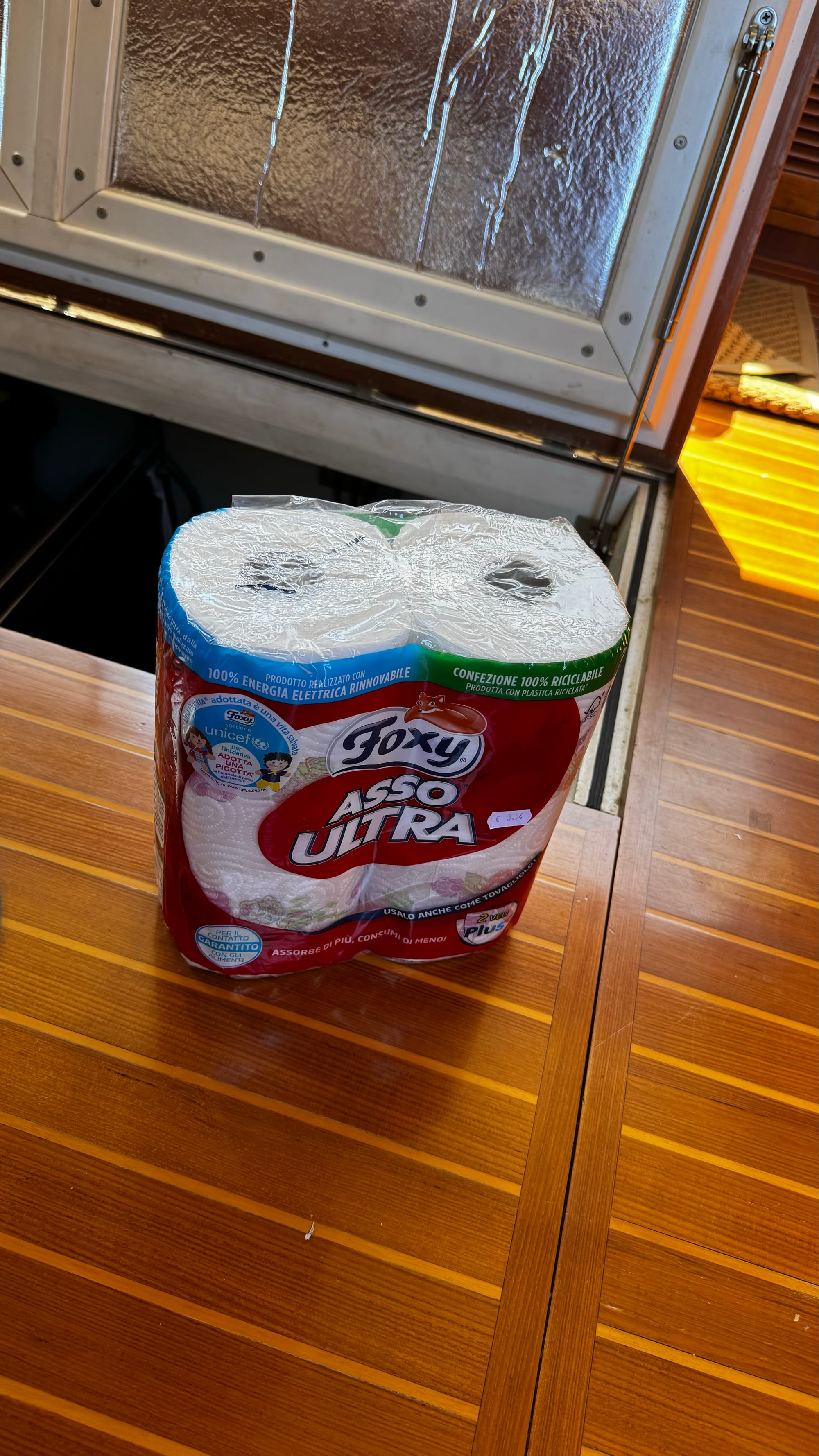
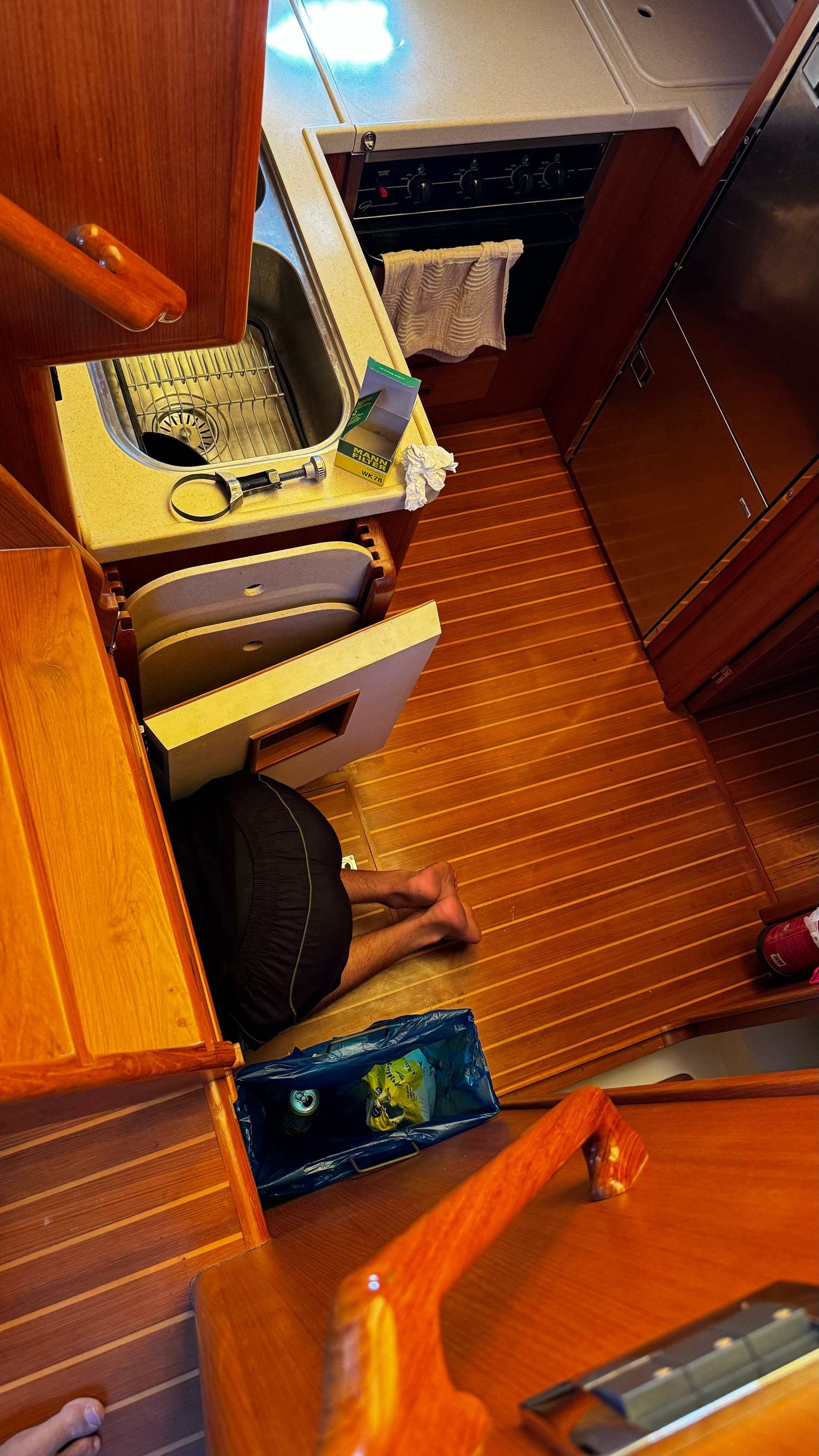
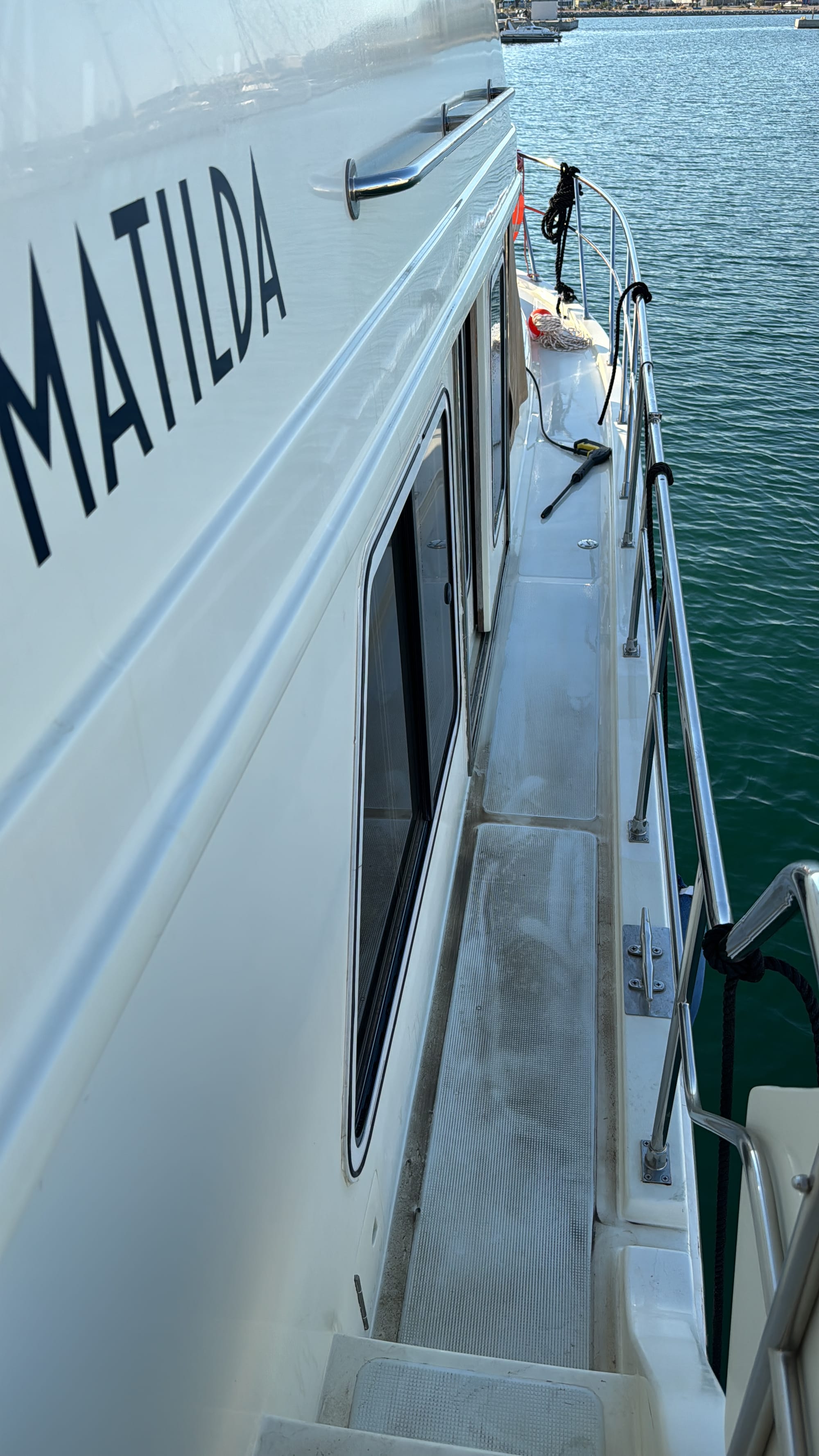
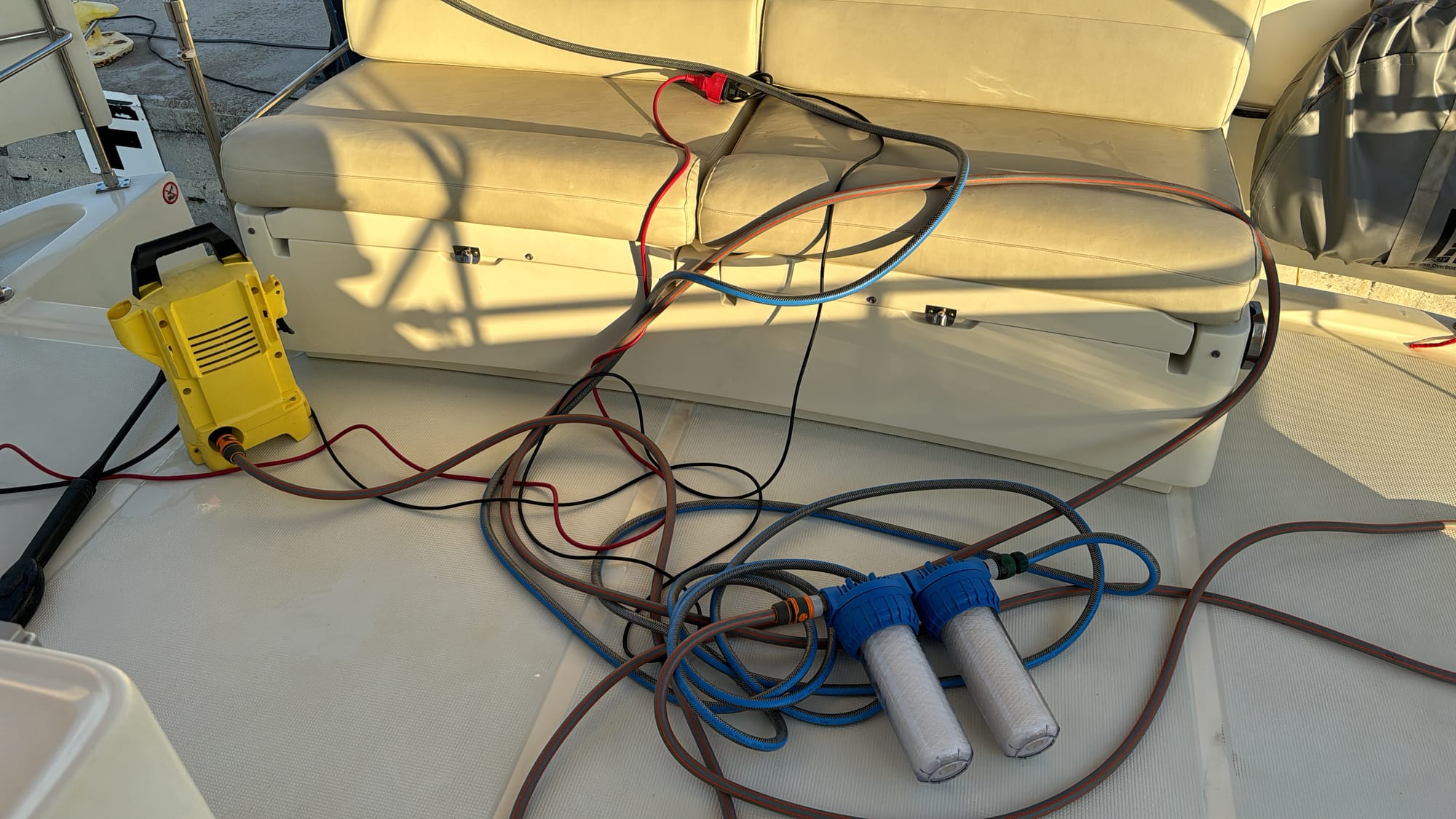
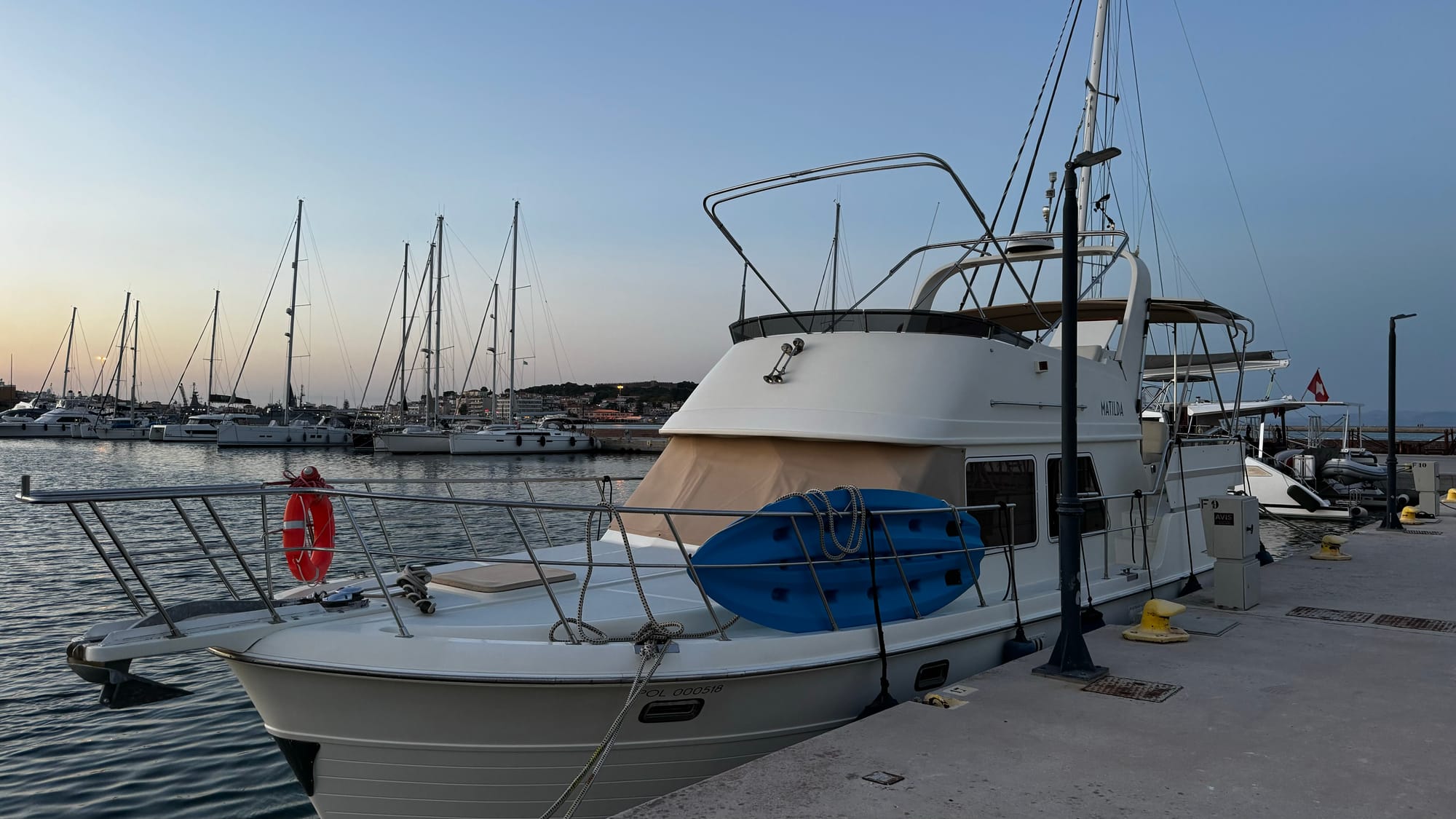
Cleaning more diesel, the mechanic and then cleaning Matilda. Finally, moved along side and ready to depart the next morning.
Was there something wrong with the fuel system? What would cause it to burst and leak? Maybe a fuel return is blocked (which would create pressure and force the fuel out of the wrong spot). I went through the system bit by bit, and sure enough, at the back of the engine room, where the watermaker is located, the two valves in the fuel return lines were closed! Commence swearing.
The theory is that those valves were accidentally closed when the mechanics attempted to fix the watermaker. And the more I thought about it, the more I realised all the diesel leakage problems started after that.
Of course, there was diesel in the bilges again (a problem I am very adept at cleaning now), although thankfully, this time, I was on to it fast enough that nothing spilt overboard.
The fuel filter was damaged from the pressure, so I needed to call the mechanic again and hope he had yet another spare. On a Sunday, while he was on holiday. He sent his son out to deal with it.
By around 6 PM on Sunday, I had a new fuel filter again, and we'd tested the engines and the generator, and FINALLY, I was convinced that the problem was resolved. Mostly, this was because I felt I'd identified a root cause and removed something that would cause the issues. And sure enough, Matilda didn't skip a beat the rest of the week.
I called the marina staff and moved Matilda alongside so I could depart early without assistance. Then, I handed in the marina keys. I was good to go.
Early on Monday morning, I woke up and headed off to the island of Psara. Naturally, I was nervous about the engines, and for the first few hours, I checked to ensure nothing was leaking, but with the fuel returns open, Matilda wasn't missing a beat. Everything was fine.
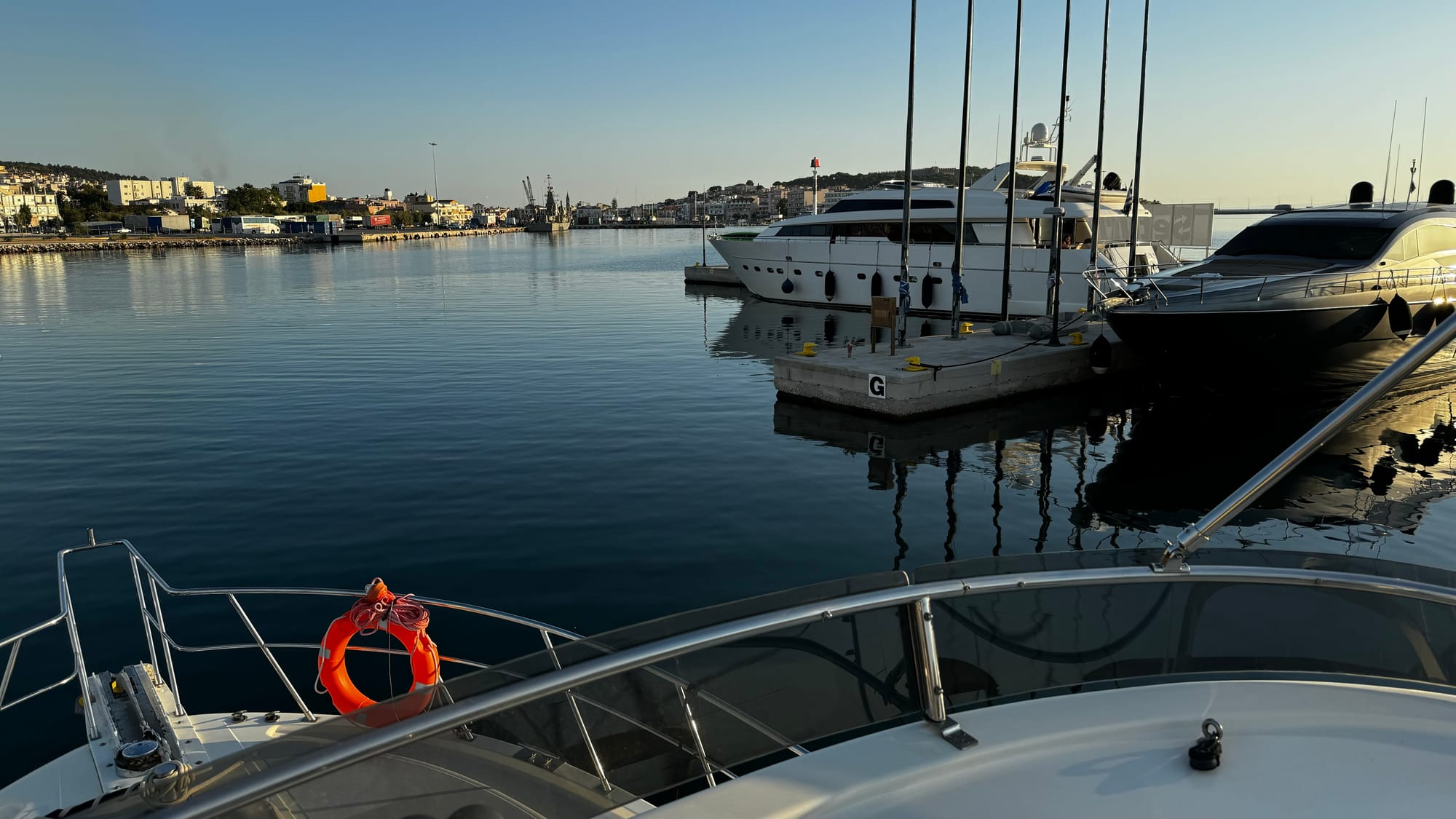
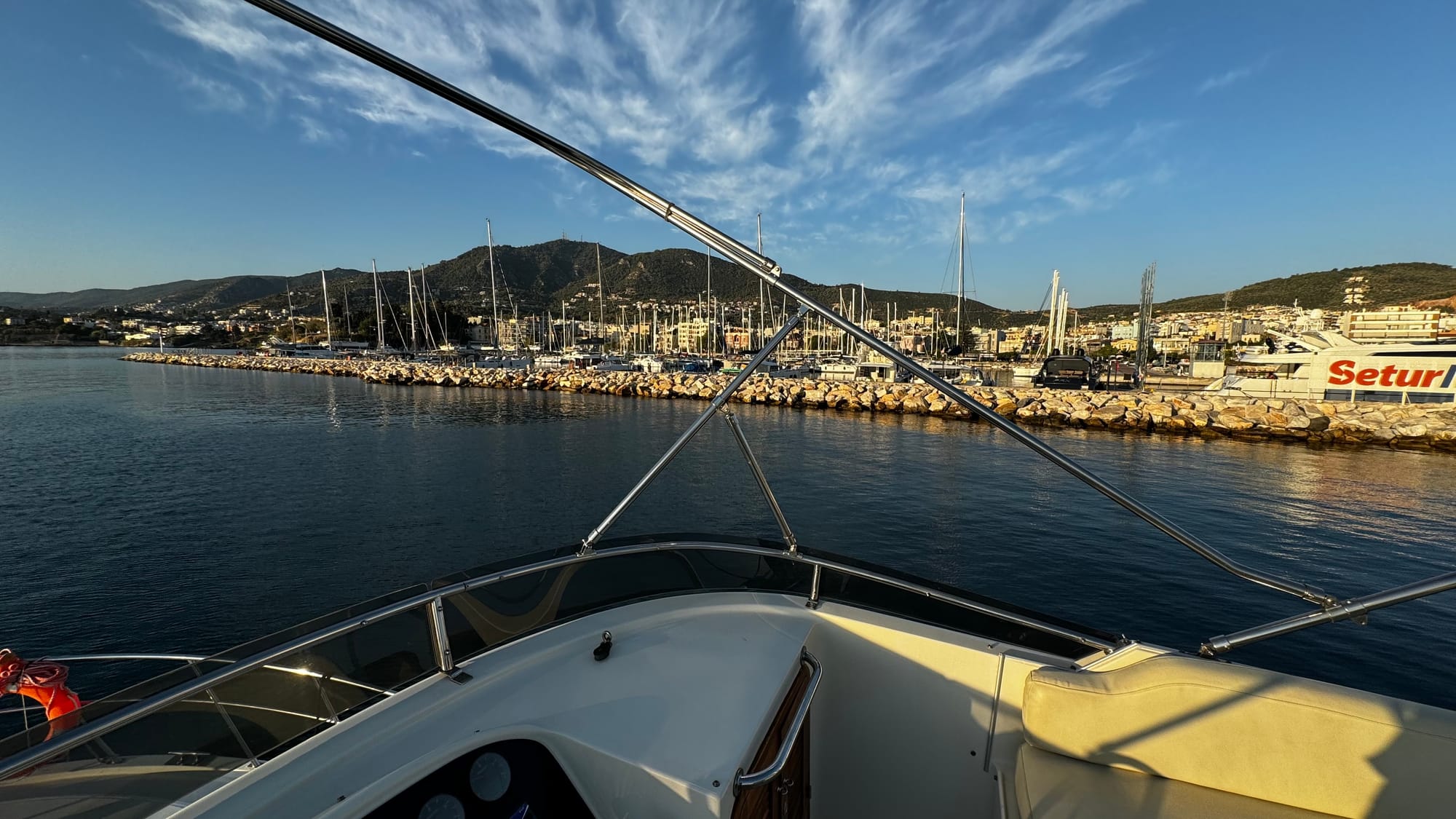
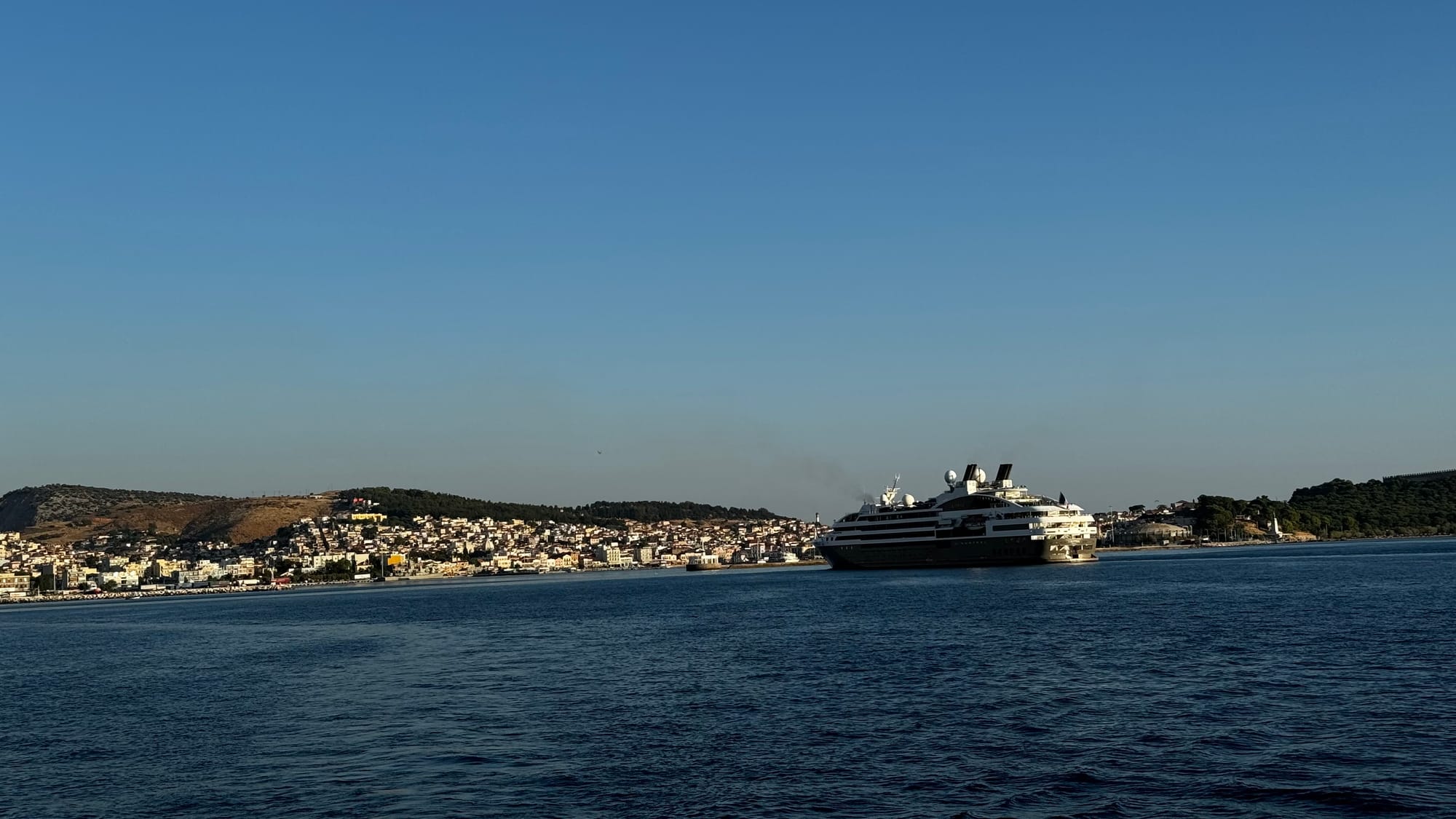
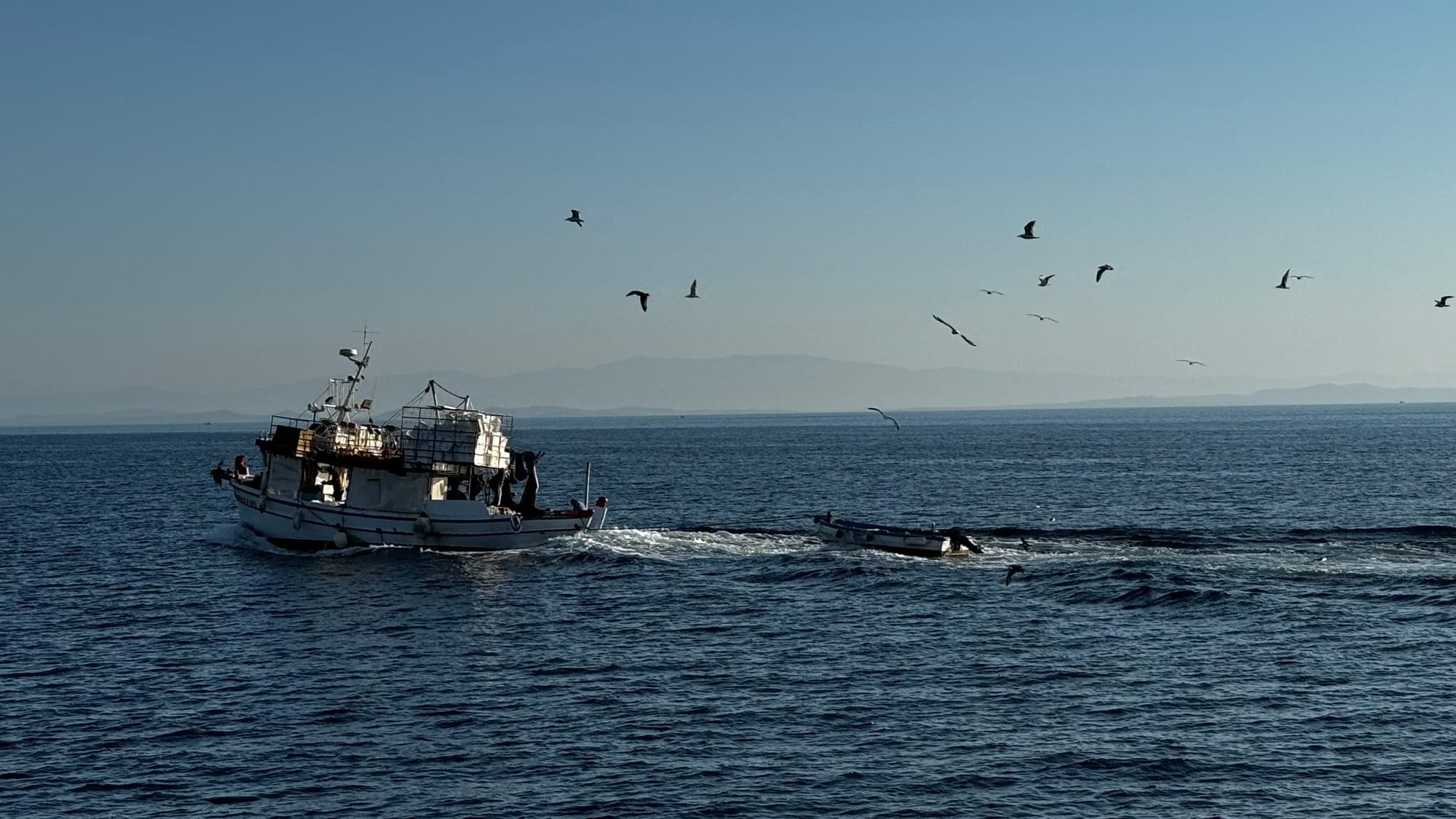
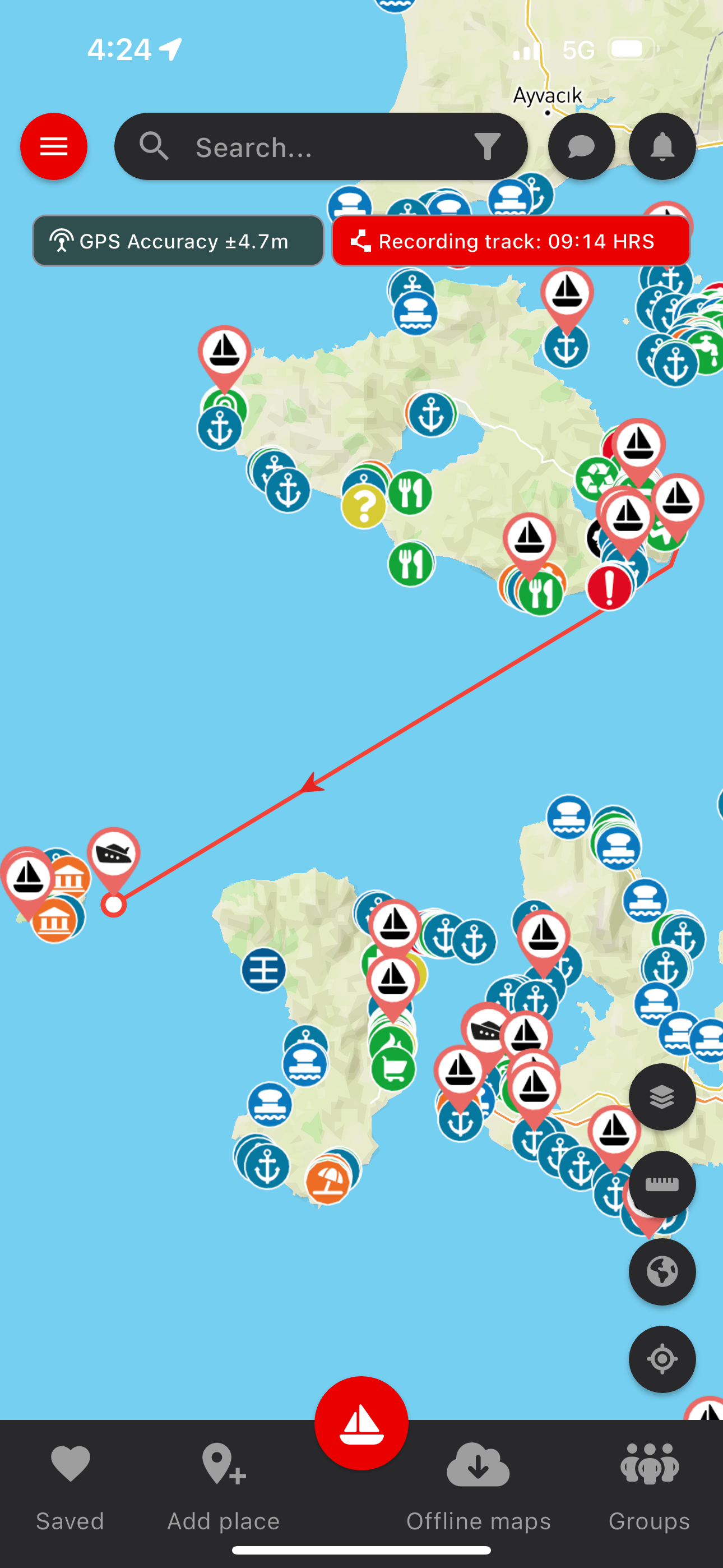
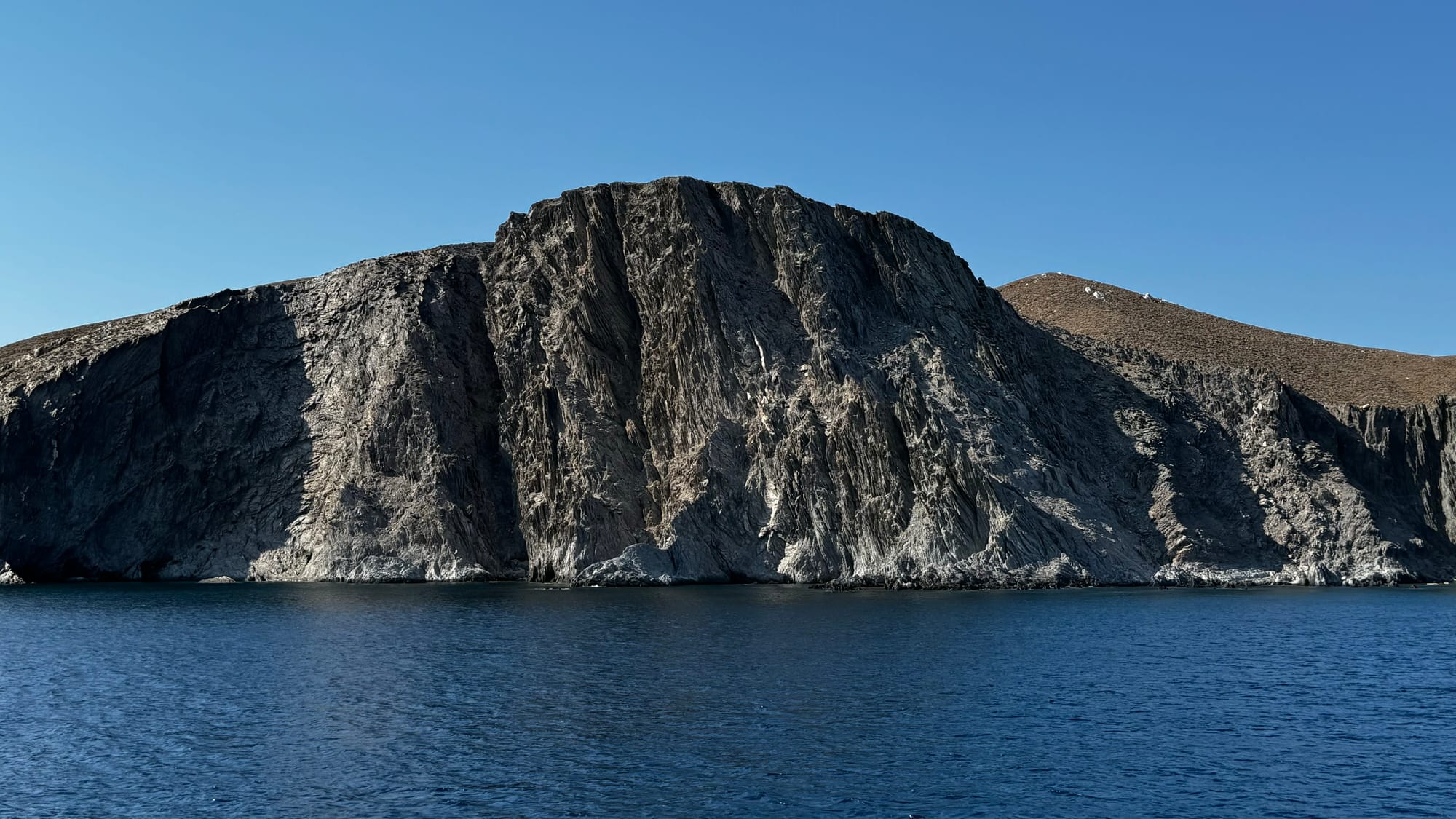
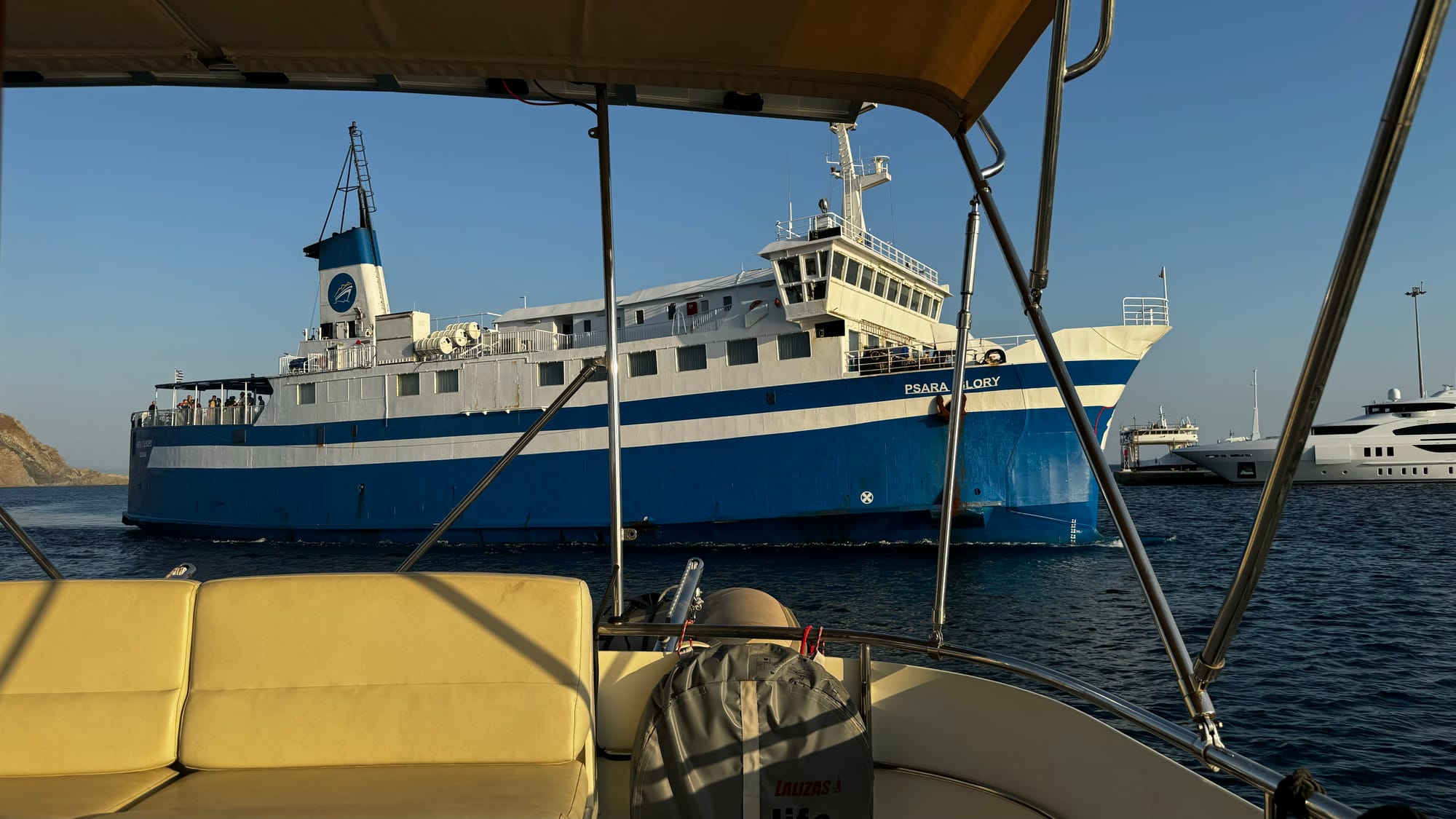
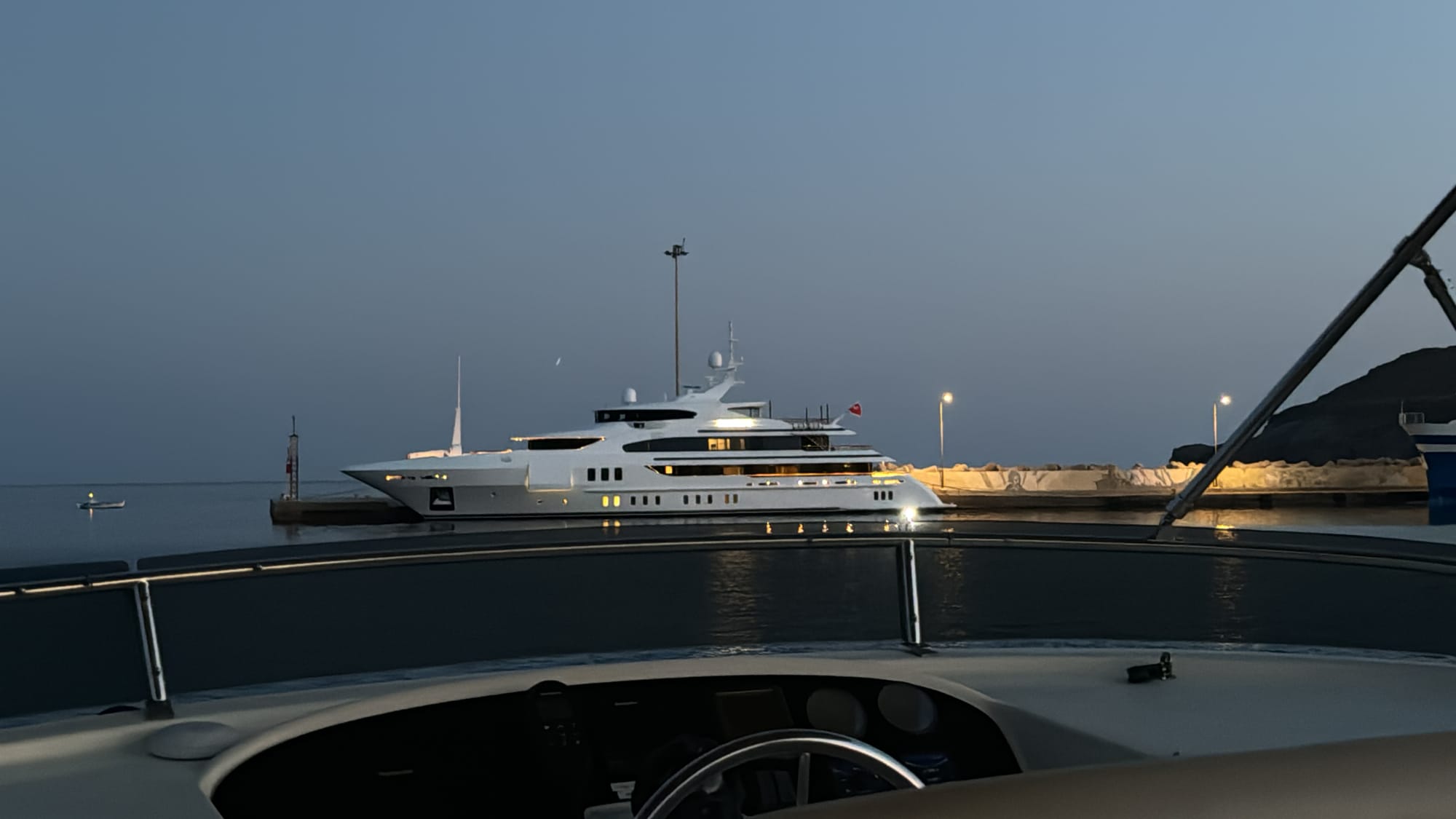
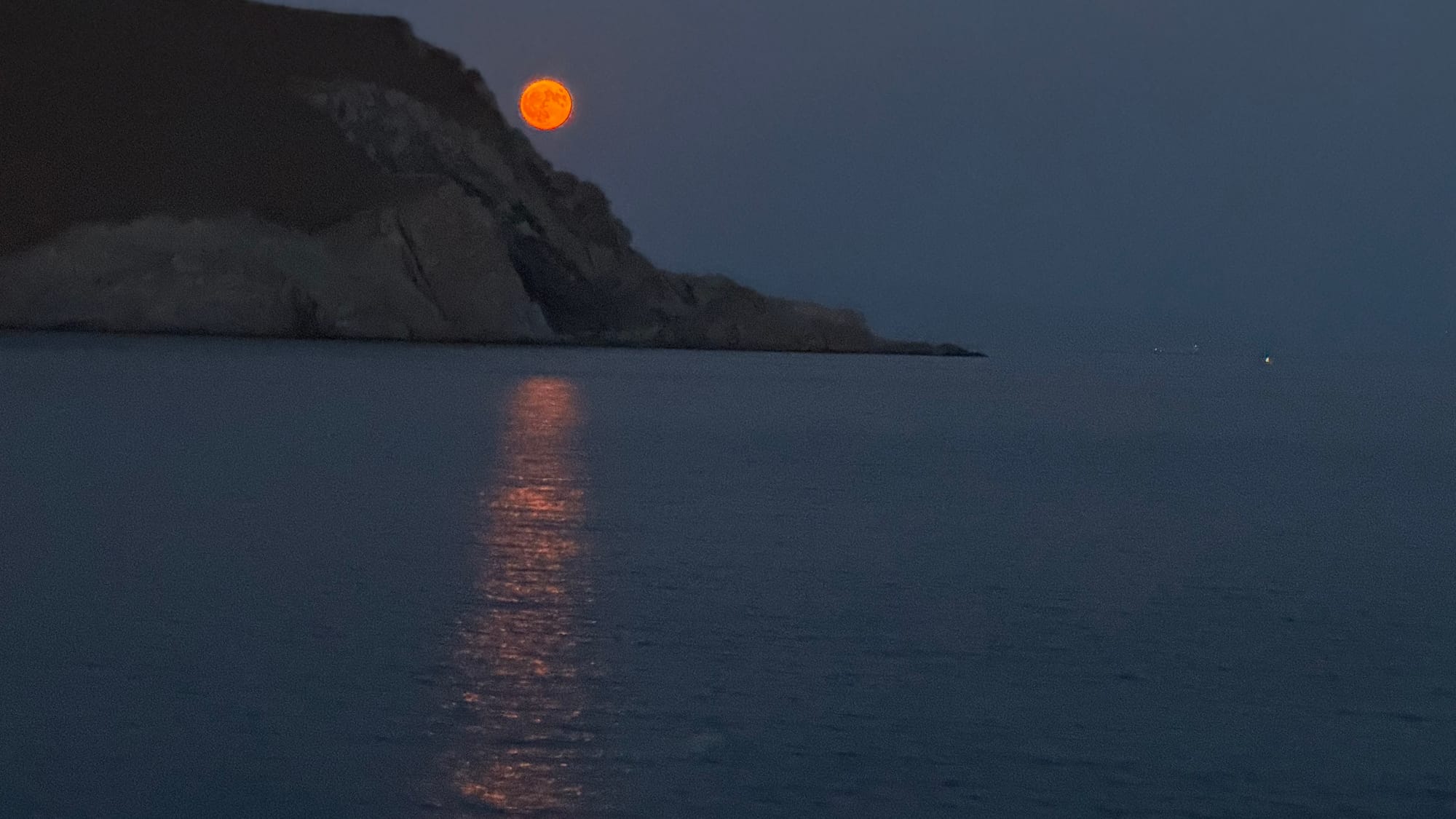
Leaving Lesvos and crossing to Psara
It was a ten-hour journey by myself, crossing from Lesvos to Psara, and I was very happy to pull into a calm anchorage, where the anchor set the first time, and I relaxed and watched the boats around. The moon was amazing (this was the super moon), and after all the challenges of the last few months, it was just good to be underway and enjoying everything.
I amused myself by creating a slightly more involved YouTube video
Tuesday morning, I was up early again, at 4:30 a.m., and left in the dark. The weather was very calm, and I had a perfect weather window to cross the North Aegean directly between Evia and Andros and then make my way around to the south coast of Athens. It got rougher between Evia and Andros, with lots of chop and 20-knot winds, but that wasn't unexpected, and I was prepared. From there, around the southern tip of Makronissos, past the Temple of Poseidon and into Agias Niklaus in the dark.


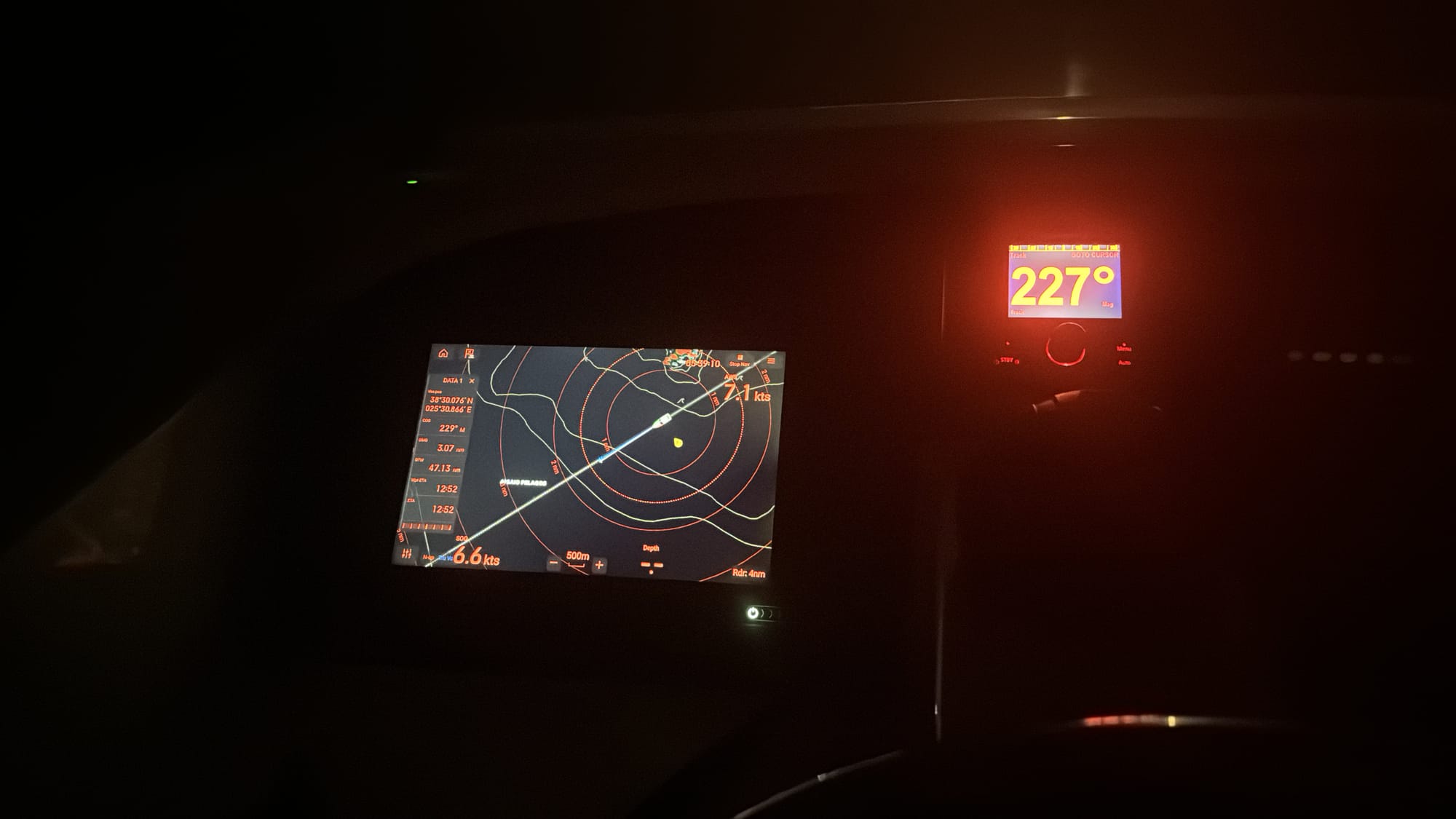
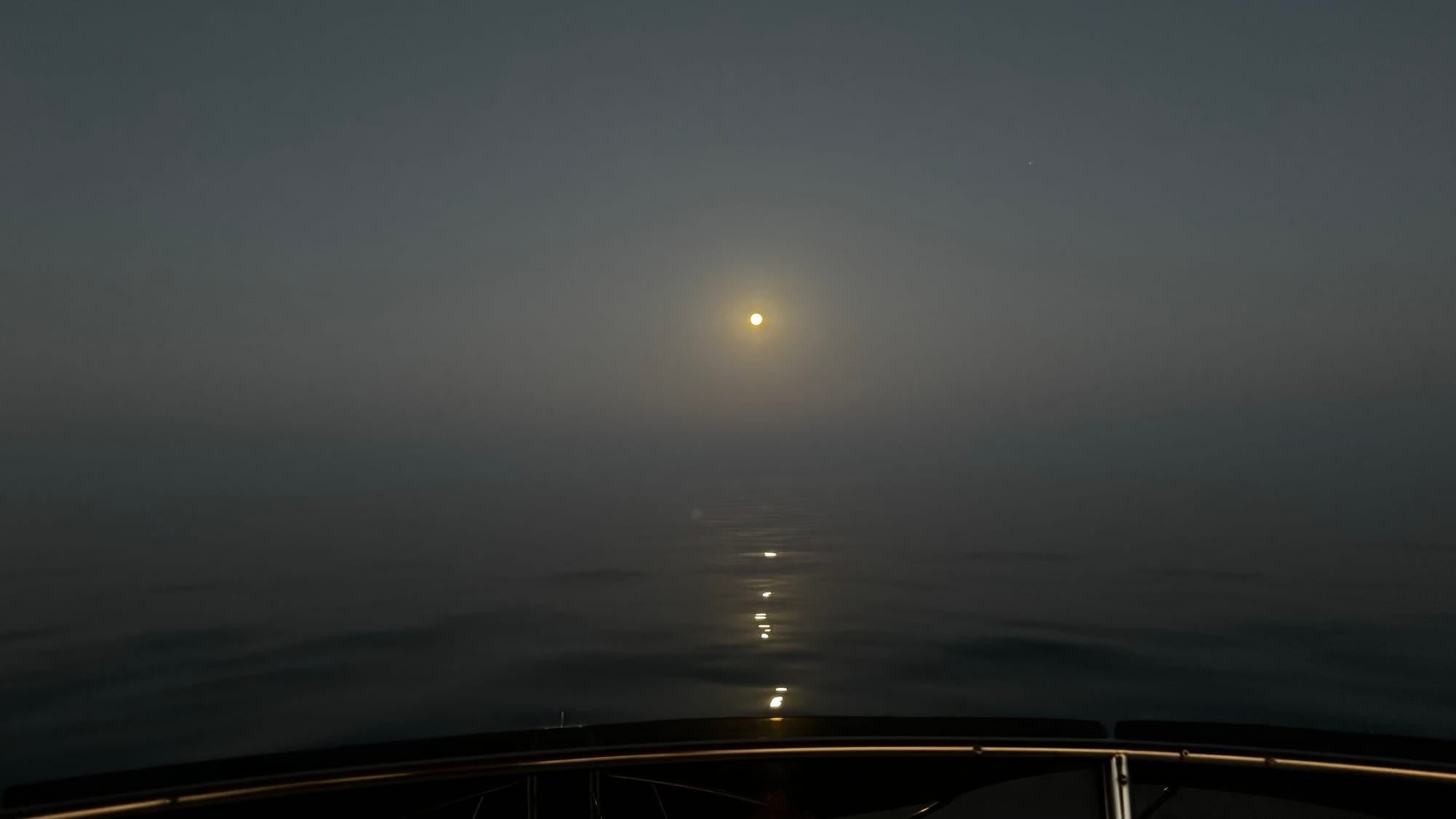

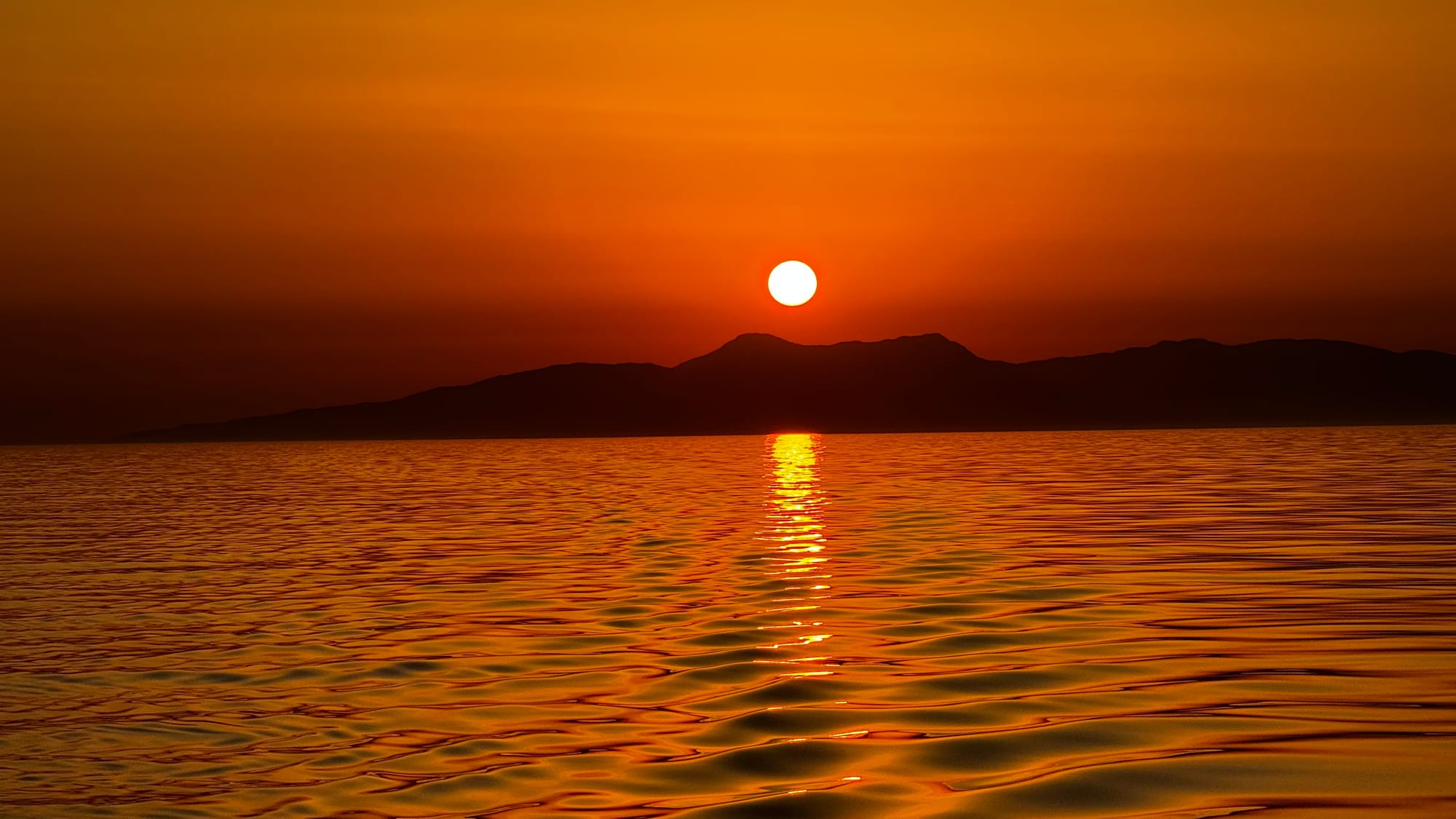
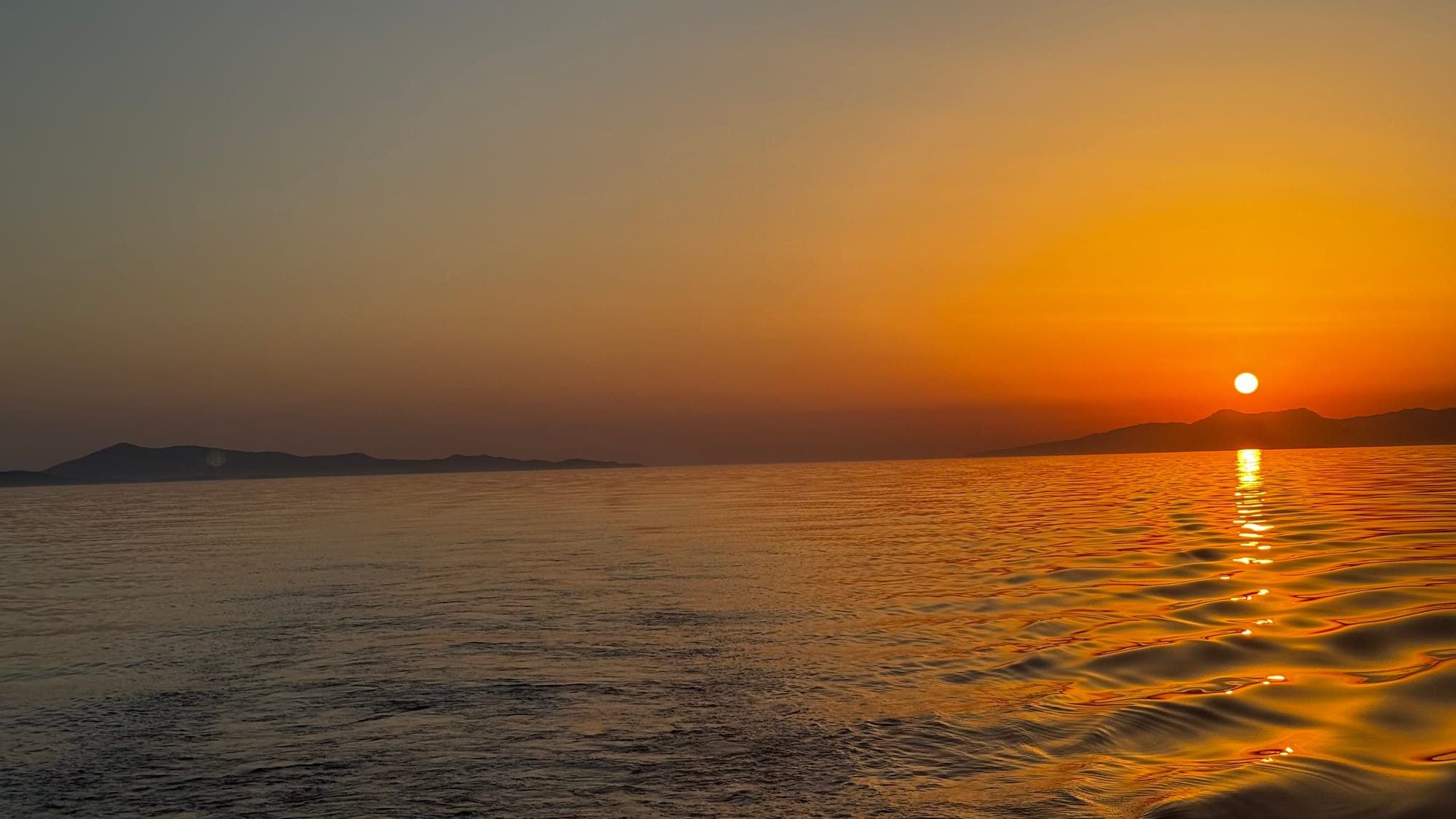
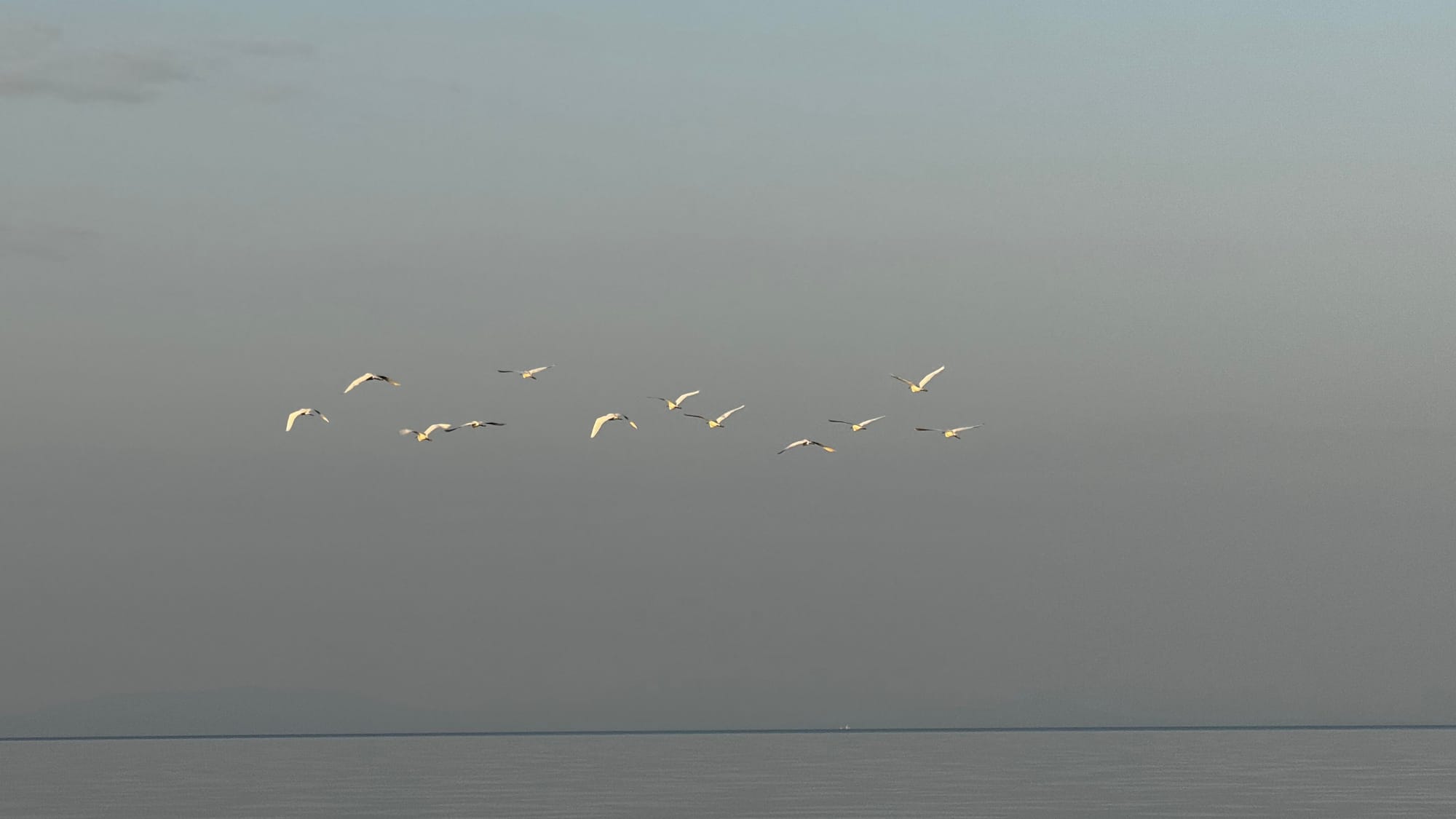
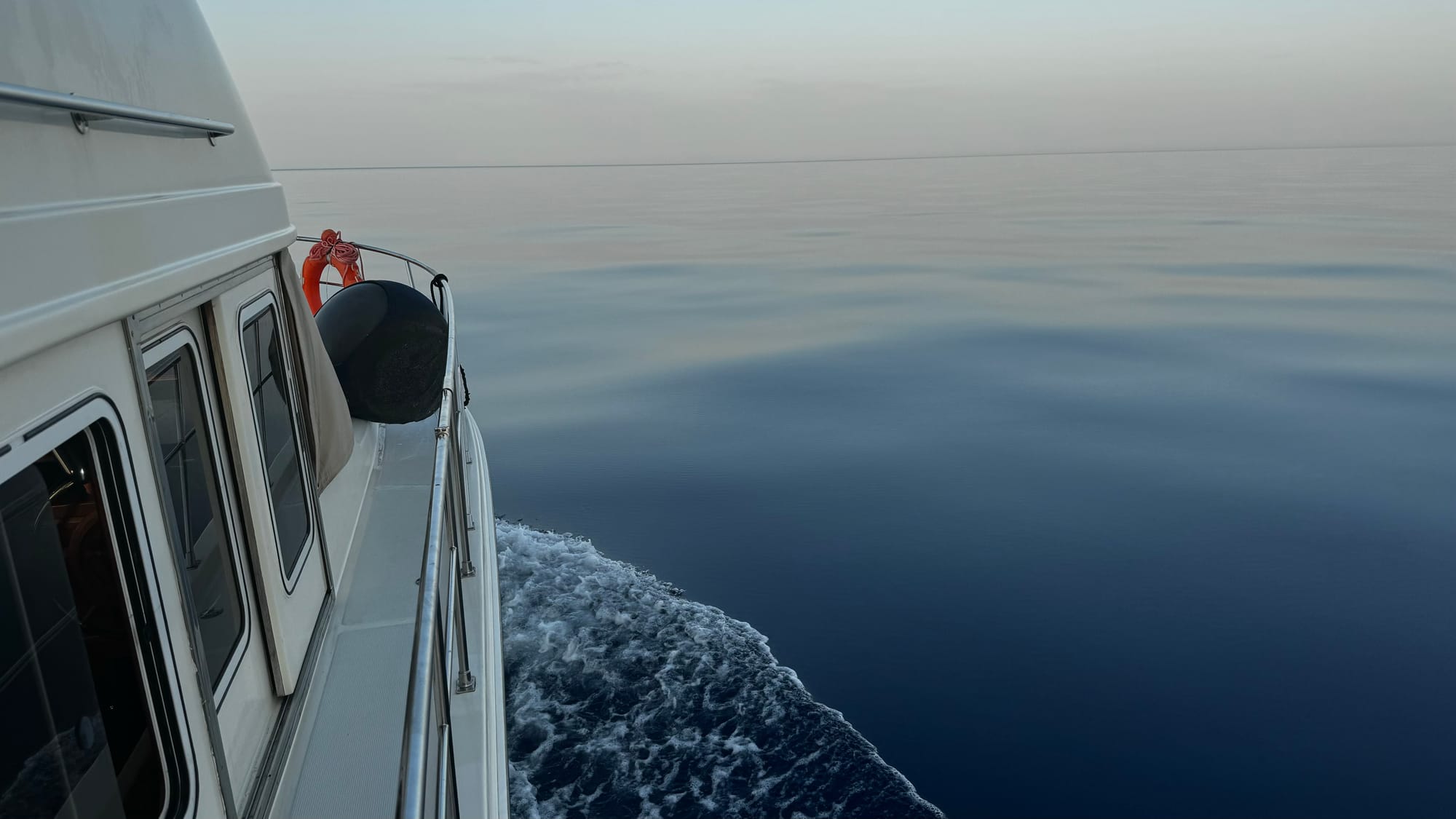
Early morning scenes departing the anchorage at Psara and heading for Athens.
After sixteen hours, I'd done it. Matilda was now relocated from Lesvos to Athens, and all that was left was to put her up on the hard Wednesday morning.
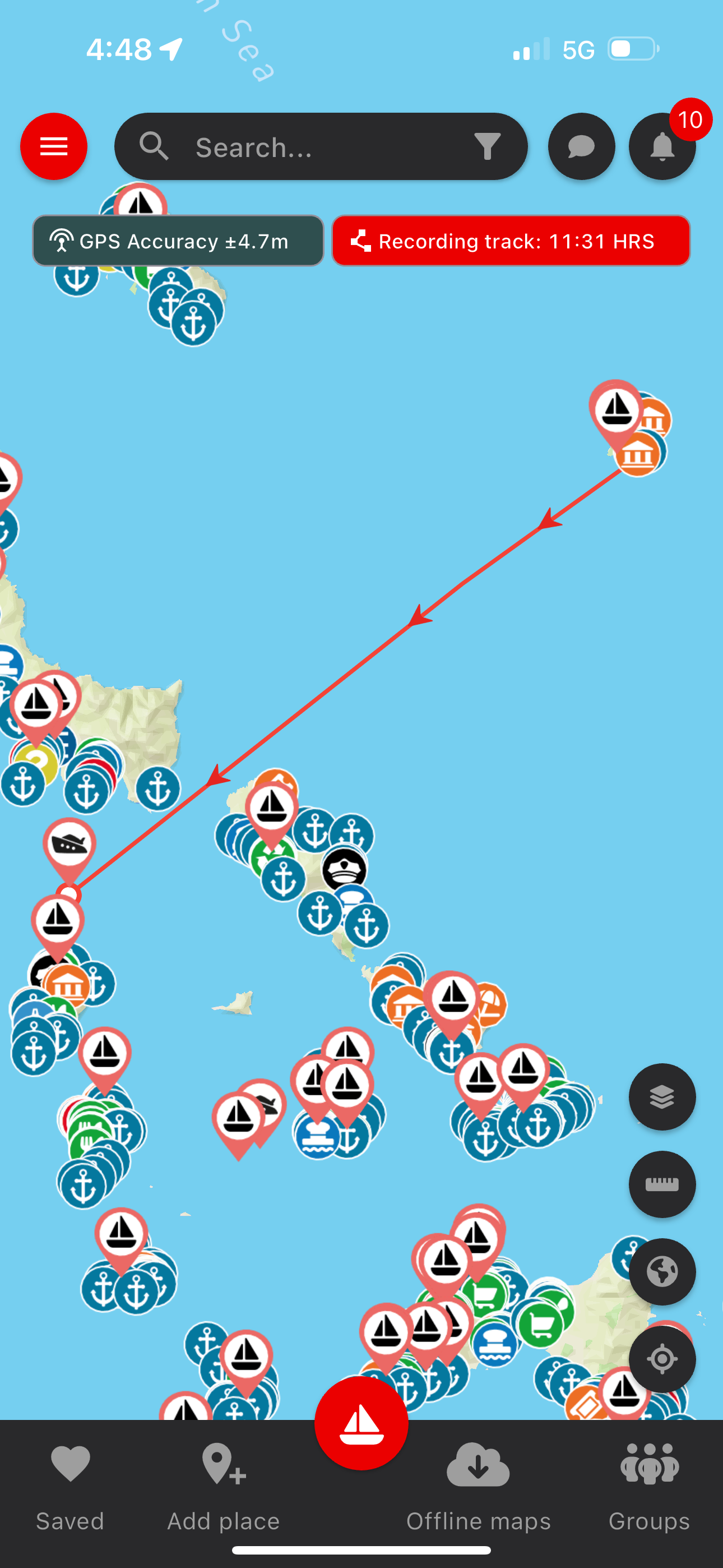
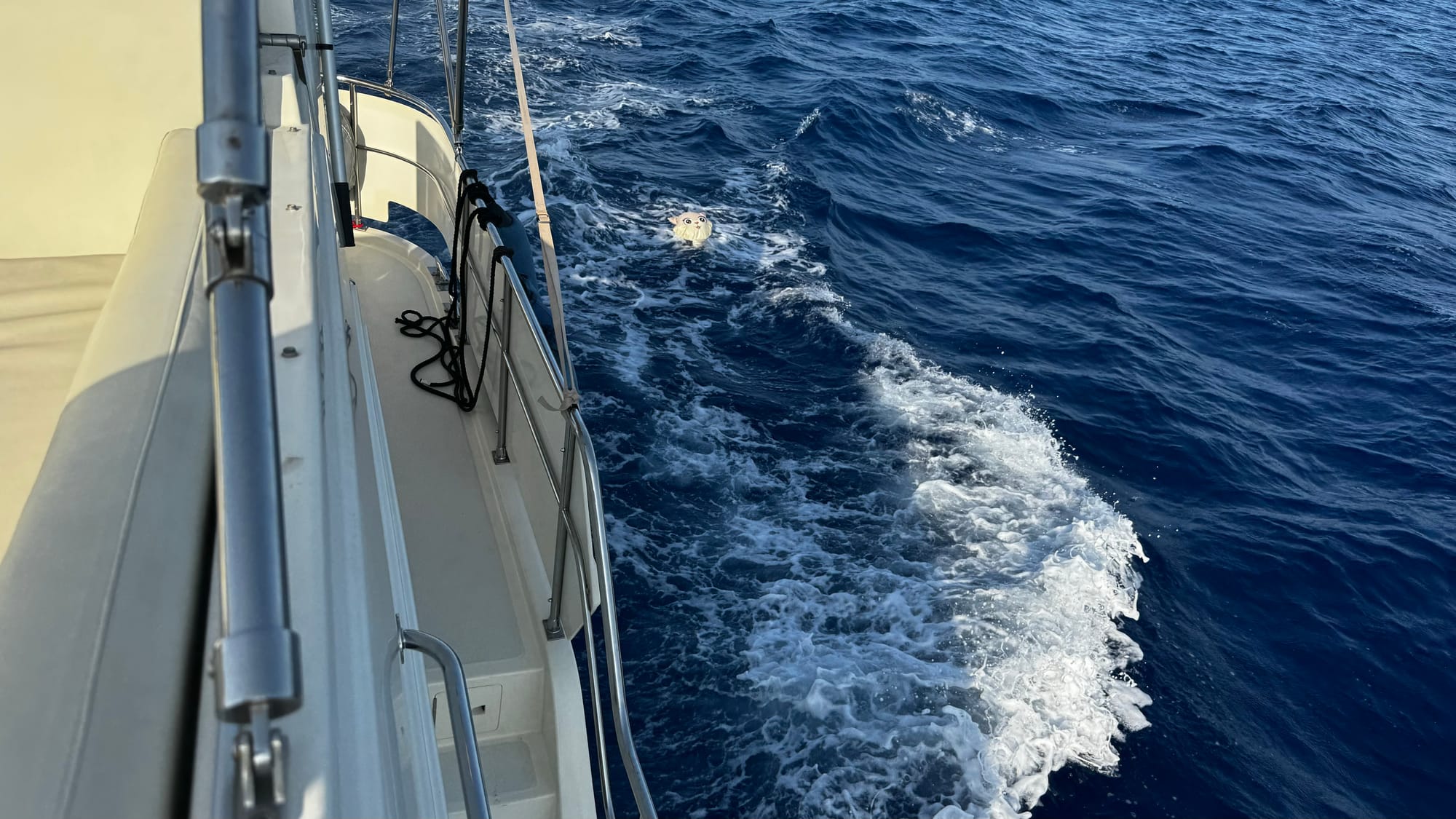
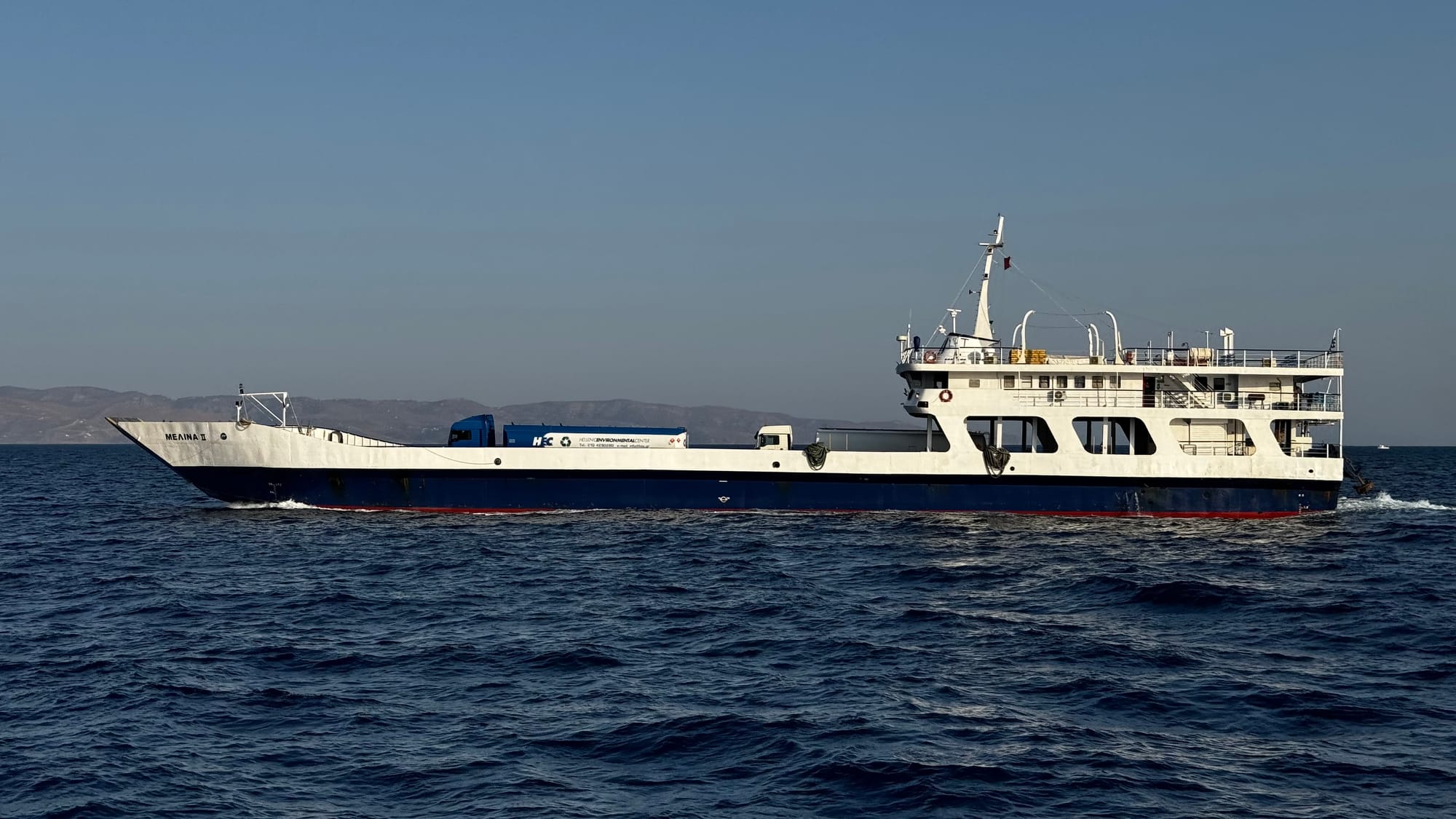
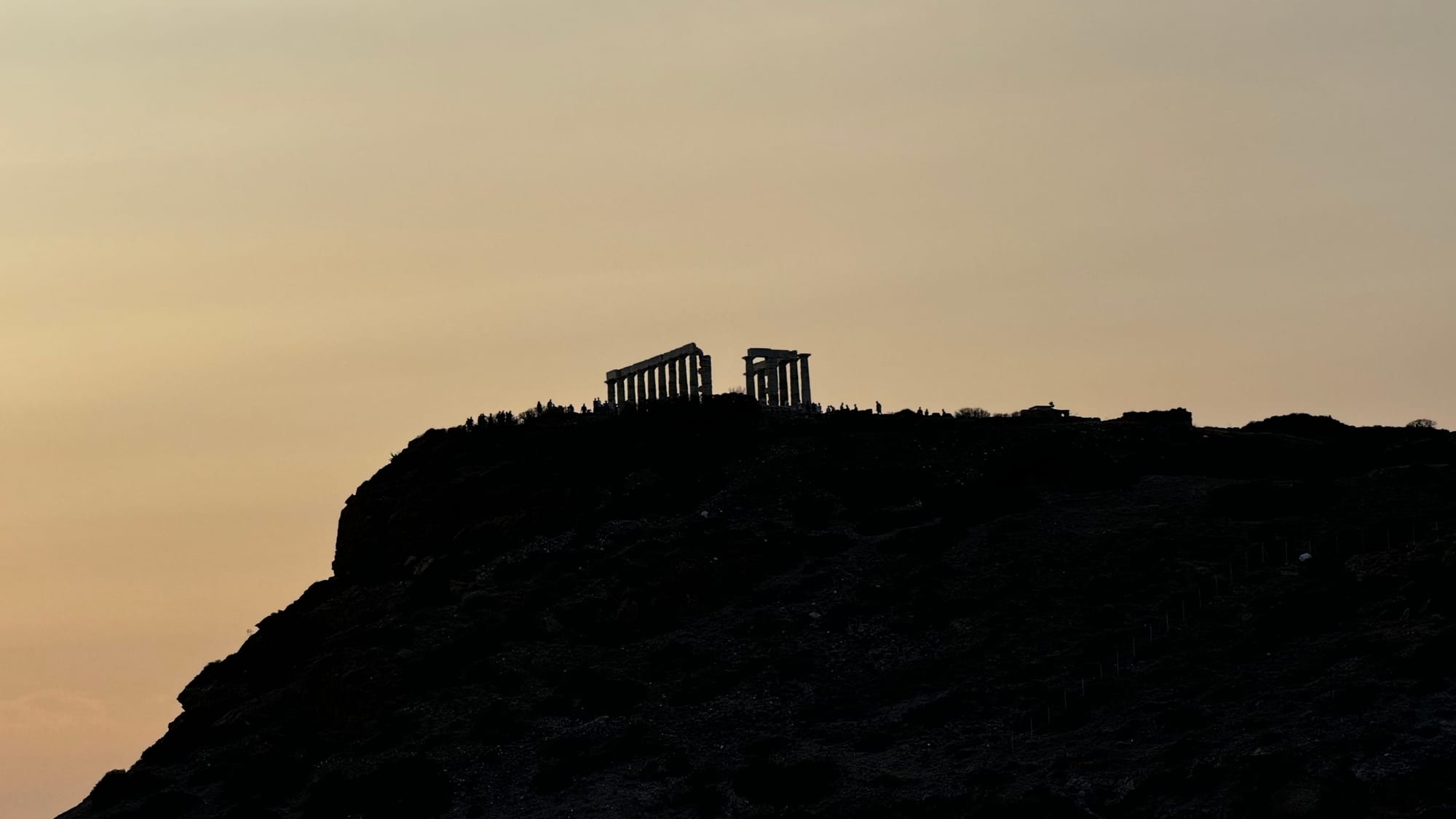
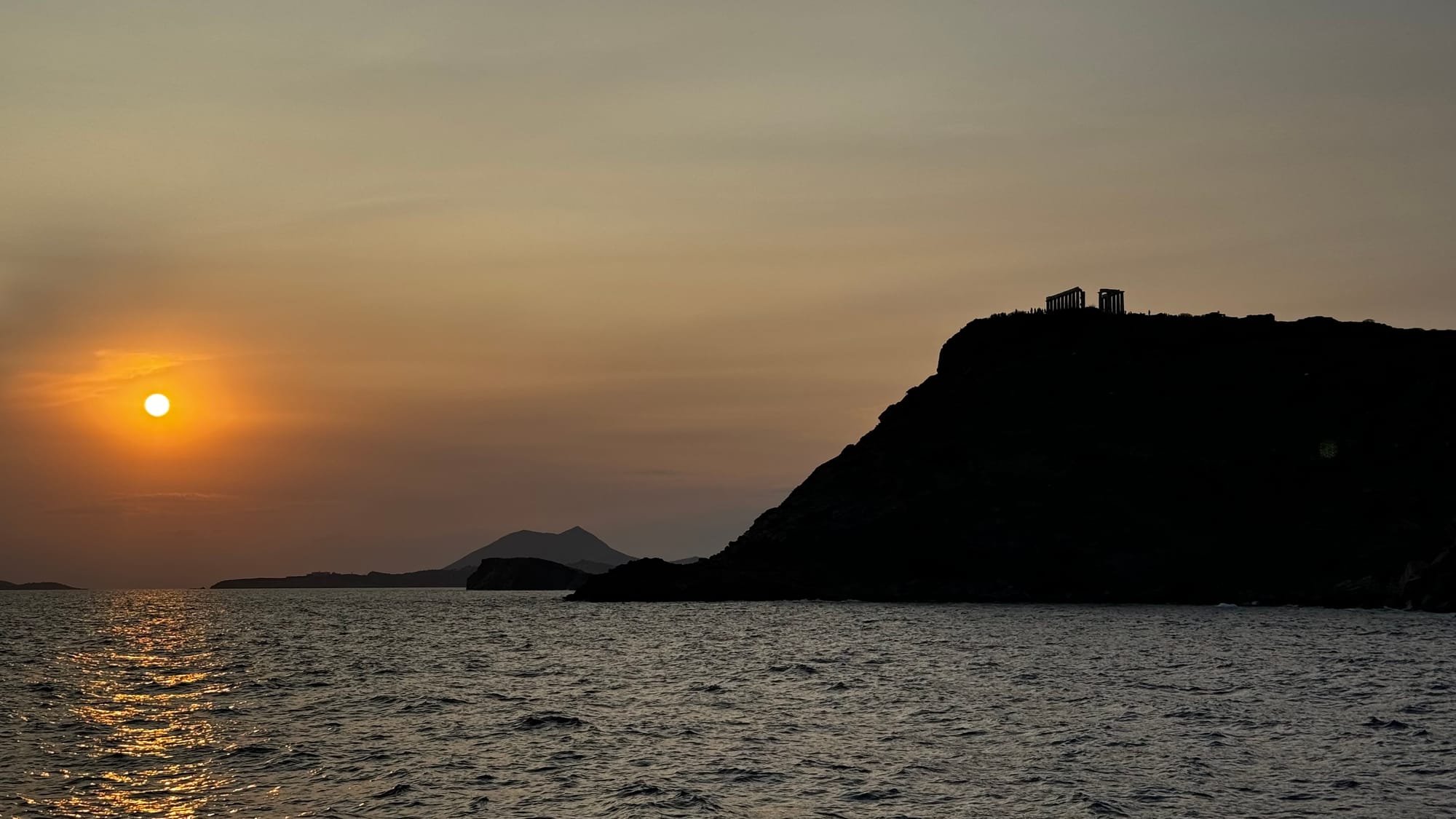
Passing the Temple of Poseidon at sunset was a lovely way to end the journey.
I woke up early again on Wednesday, getting underway around 8 a.m. to get up the coast to Glyfada in time for the haul out. I arrived about 20 minutes early, so I tied up alongside (on my own!) and waited. I was impressed when, as promised, at 10.30, the trailer arrived at the slipway to haul out Matilda.
I've only hauled out with Karina on board; trying to steer a 16+ tonne boat onto a narrow trailer was challenging without her to offer moral support and point me in the right direction. But I did it—not without drama, however! The stern thruster cut out (overheated), removing a useful tool at a critical moment. Still, I did it and manoeuvred Matilda onto the trailer—only for the hydraulics on the trailer to fail.
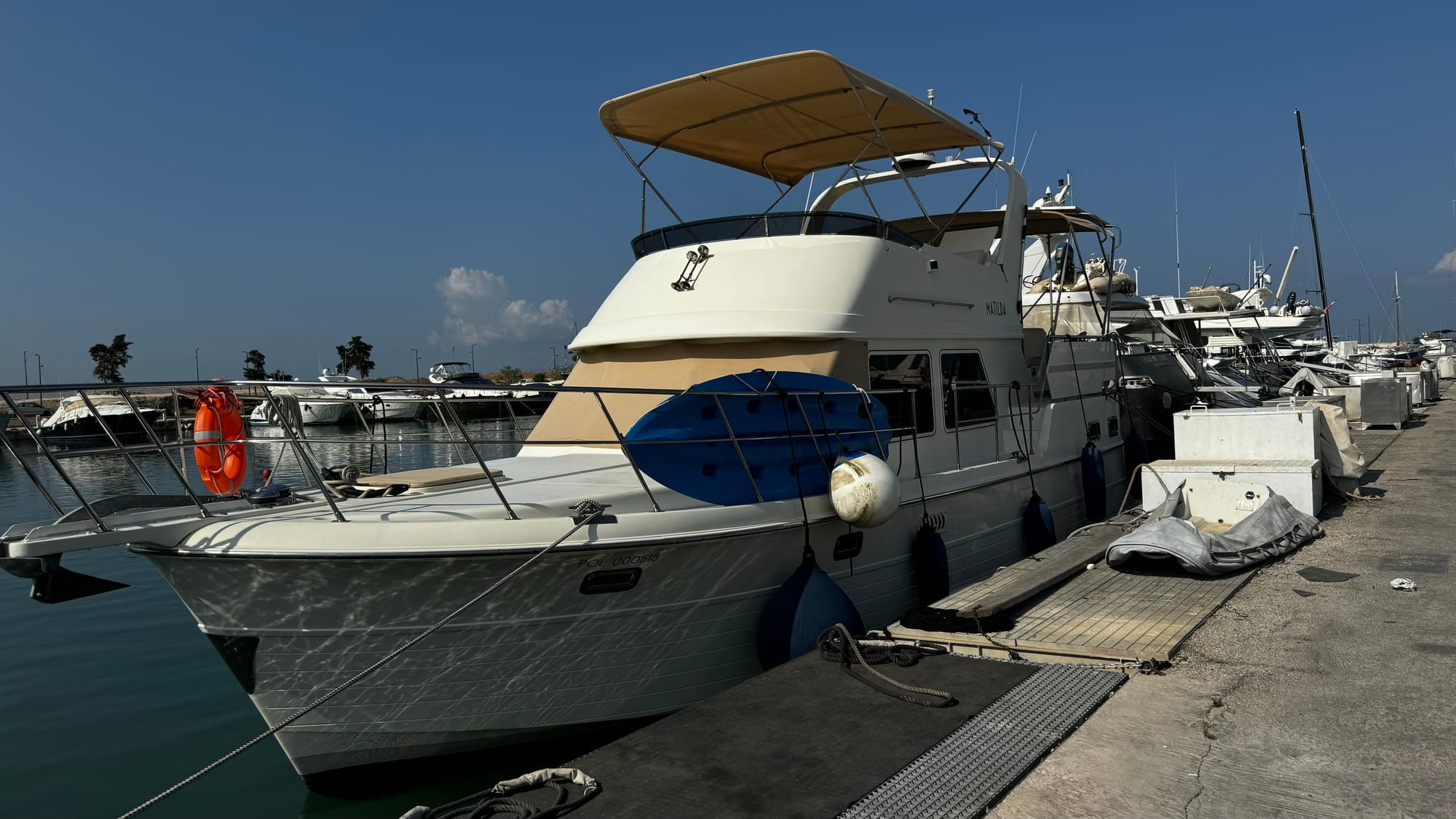
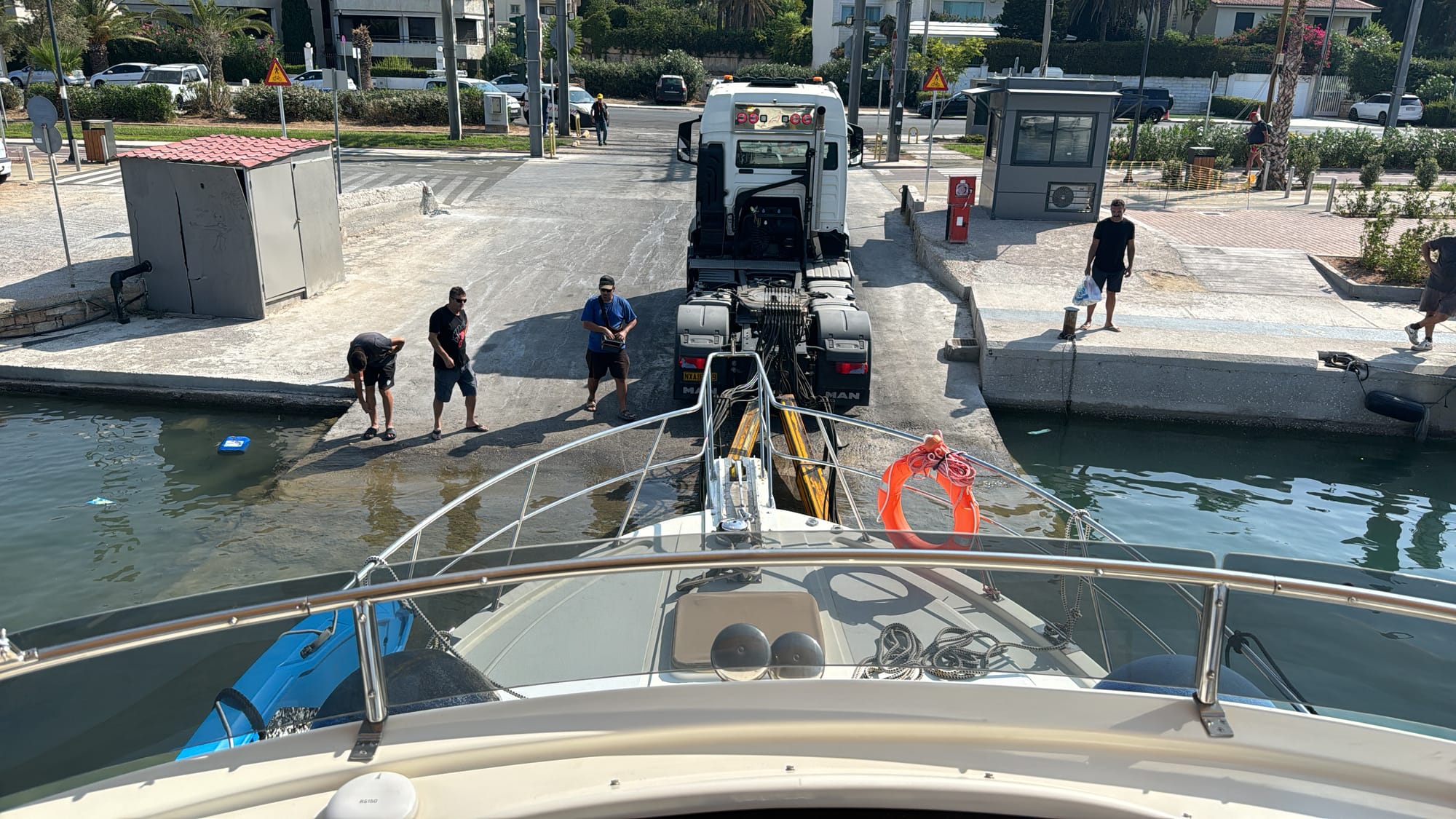
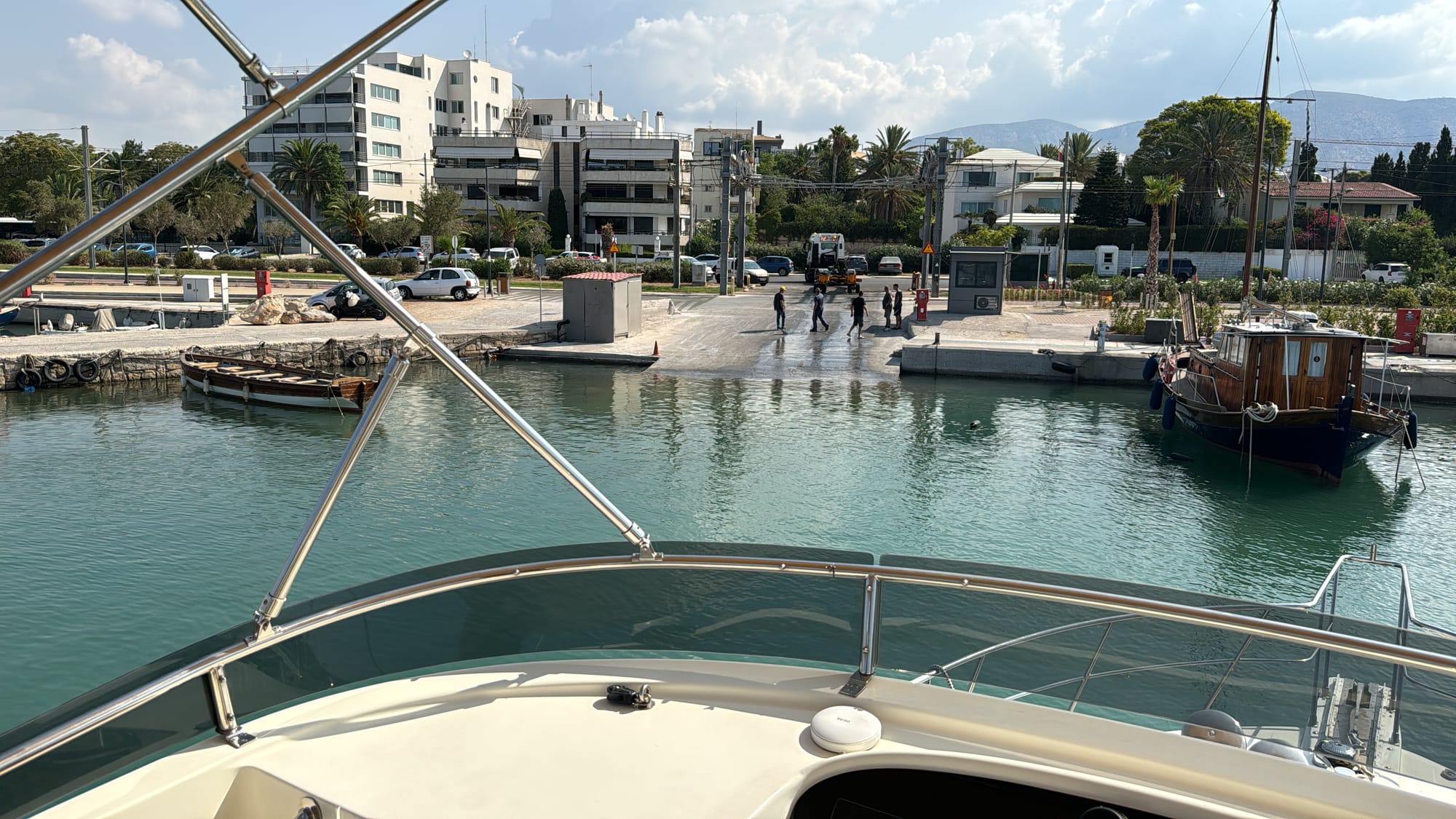
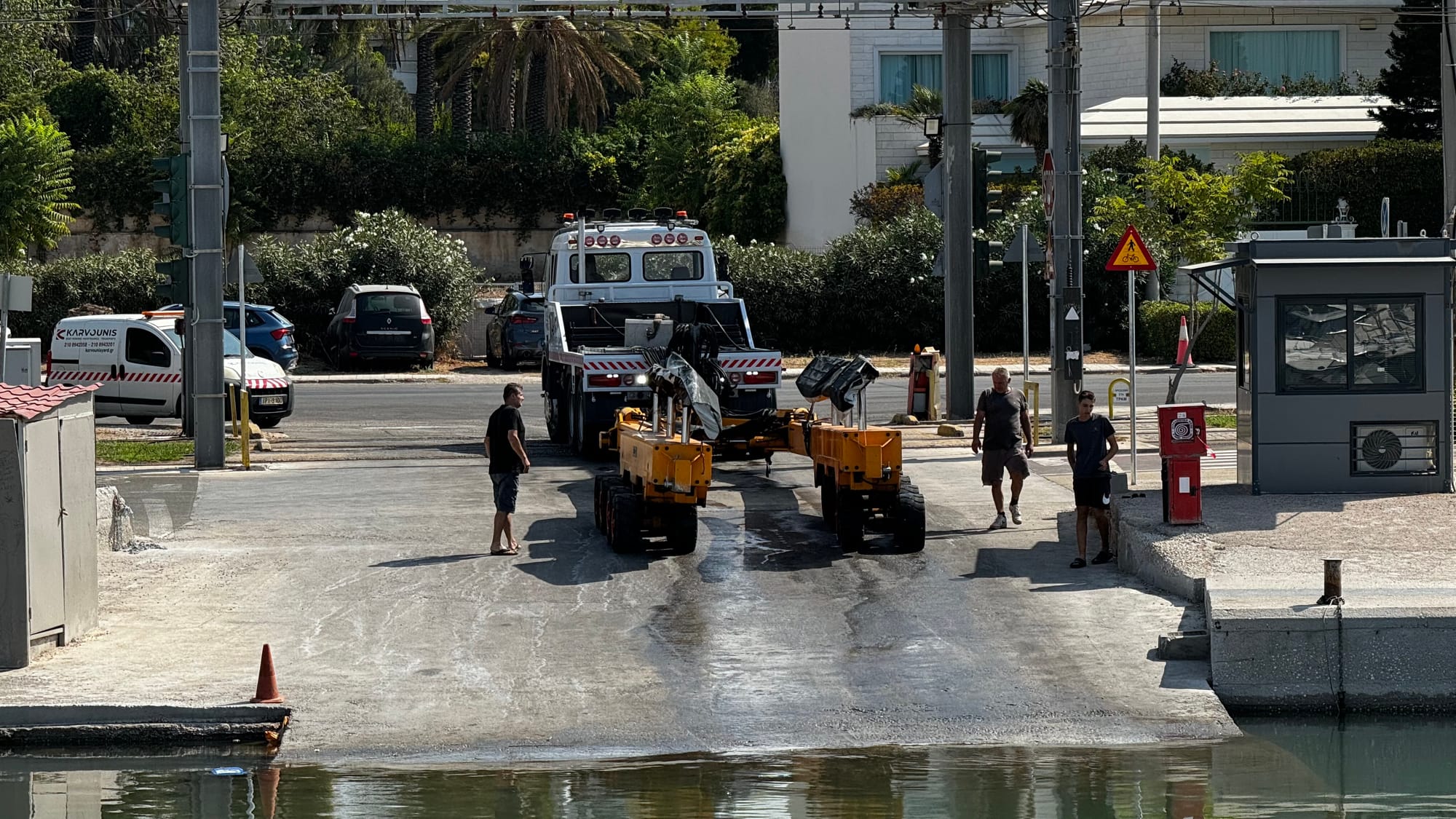
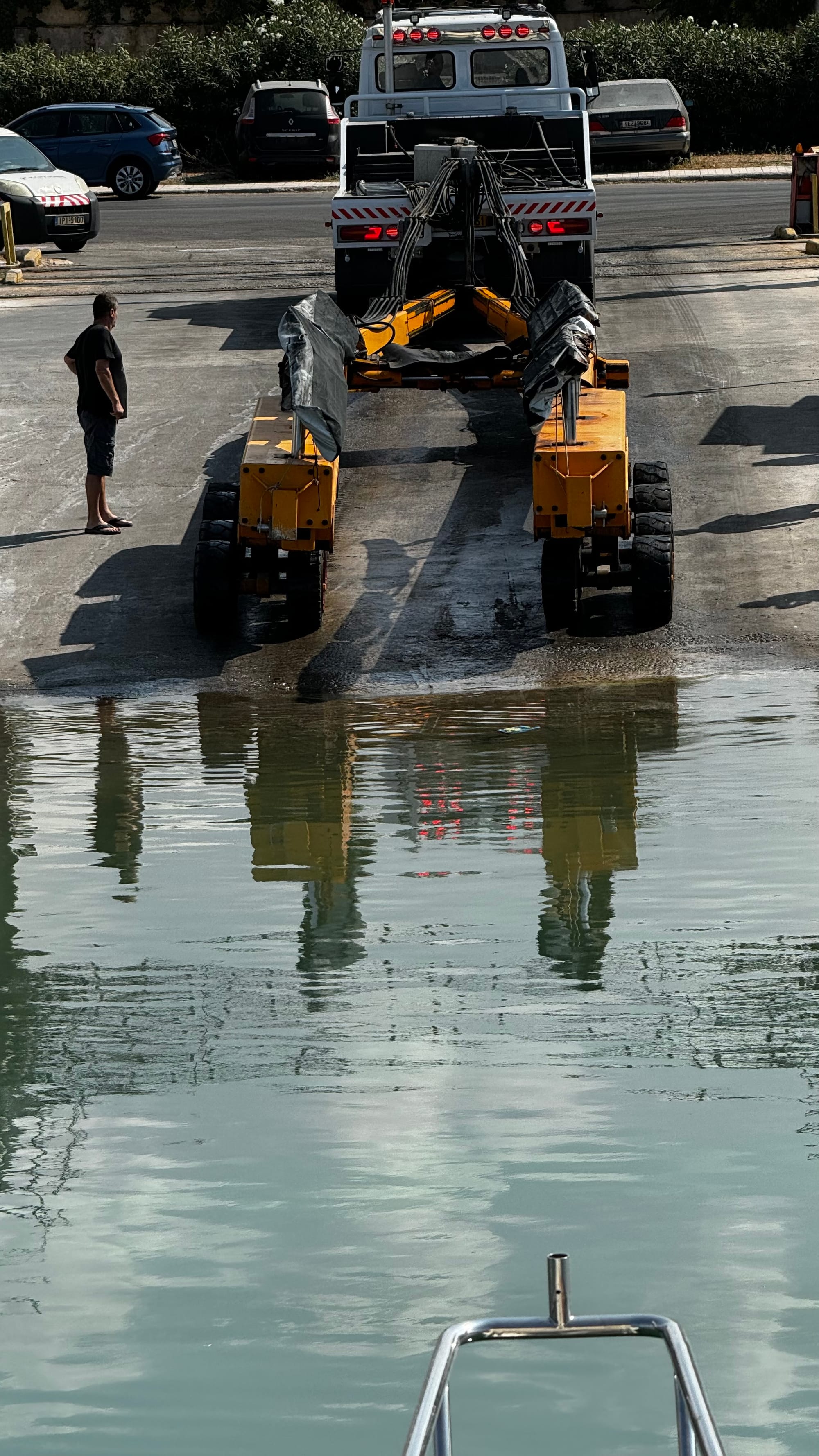
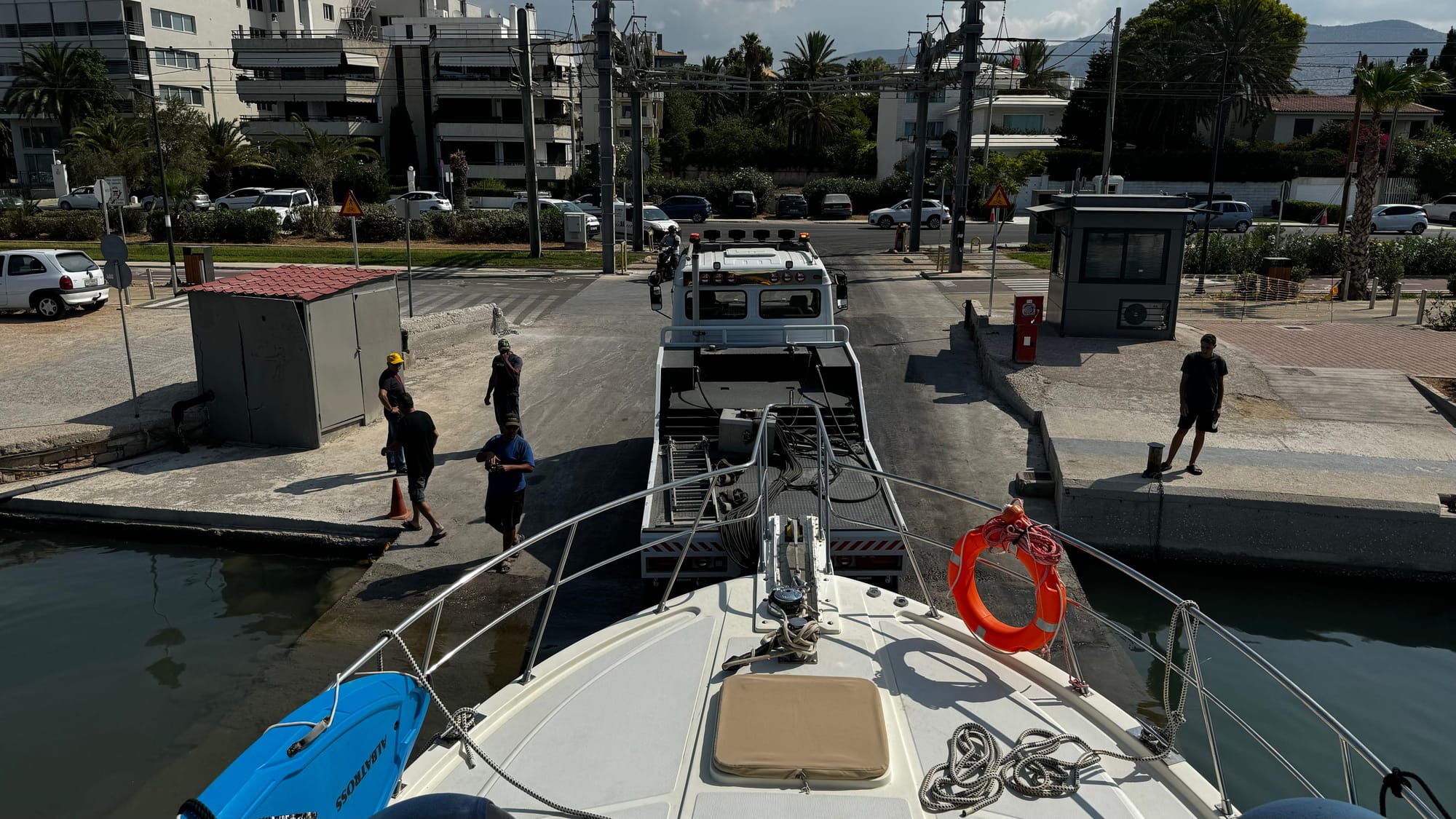
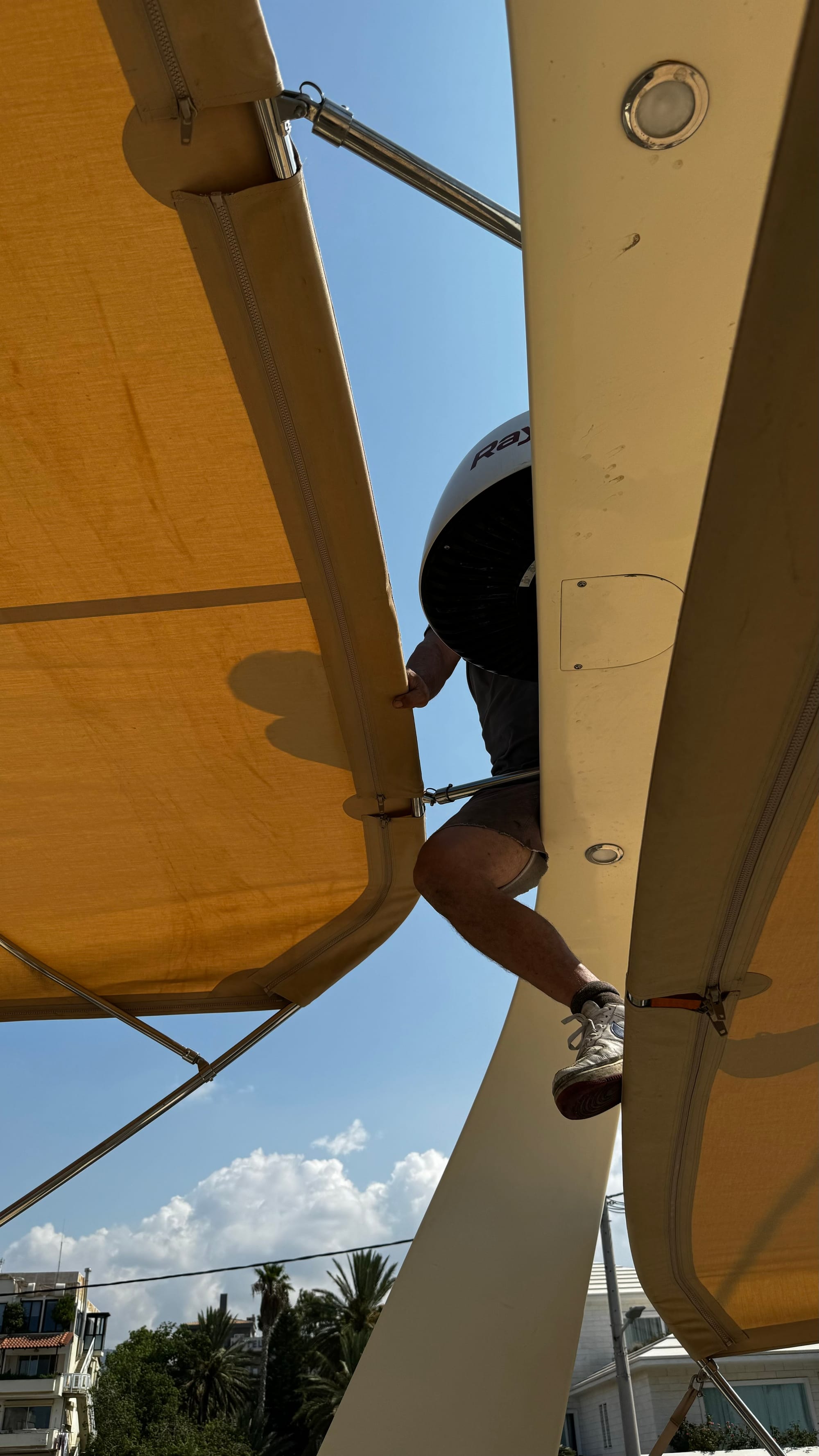
Haul out. The man sitting on the top of Matilda's arch sat there underway. His job was to lift any lines over the mast head!
"Back up," they said, "we're going to replace the trailer." So I reversed off, launching Matilda again, and then sat drifting, waiting for the new trailer to return to do it all again. It's fair to say I was quite stressed.
Once the new trailer arrived, it was easier the second time around (practice makes perfect), and before I knew it, Matilda was hauled out of the water and had become a caravan! I sat up front and made a timelapse of the whole thing, which is fun to watch as she drives up along the road to the boatyard.
Watch Matilda come up out of the water and travel to the boatyard!
But the job wasn't done yet. I had to pay the yard, chase mechanics, tidy up and winterise the boat, flush the engines, pack, pack, and more packing to be ready to leave on Thursday afternoon.
There were several video calls with Karina, working through the list of must-haves and trying to figure out how to fit them into the luggage I had, balancing weight, bulk, and priority to finally have the majority of our possessions left on Matilda ready to take to Belgium.
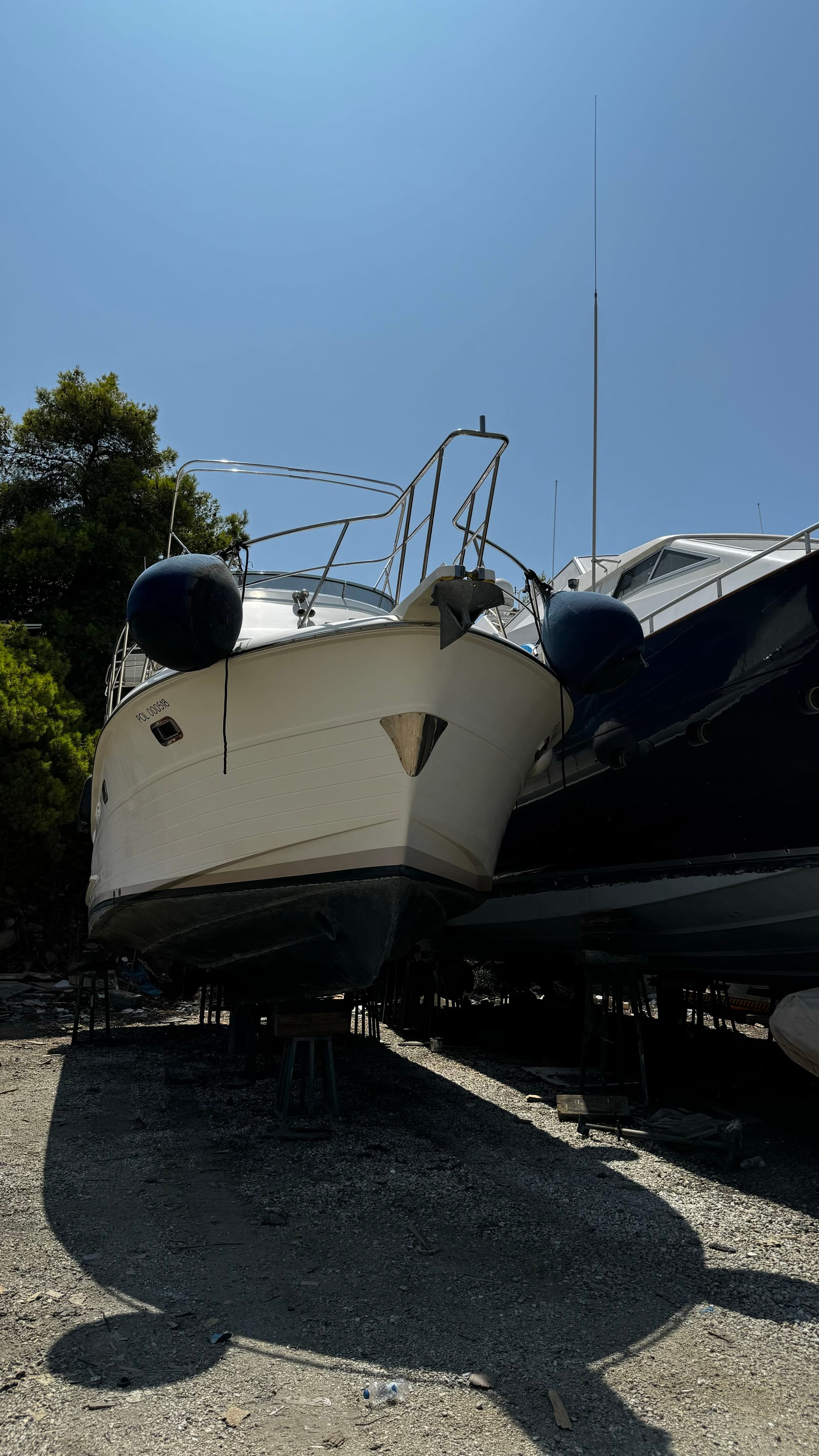
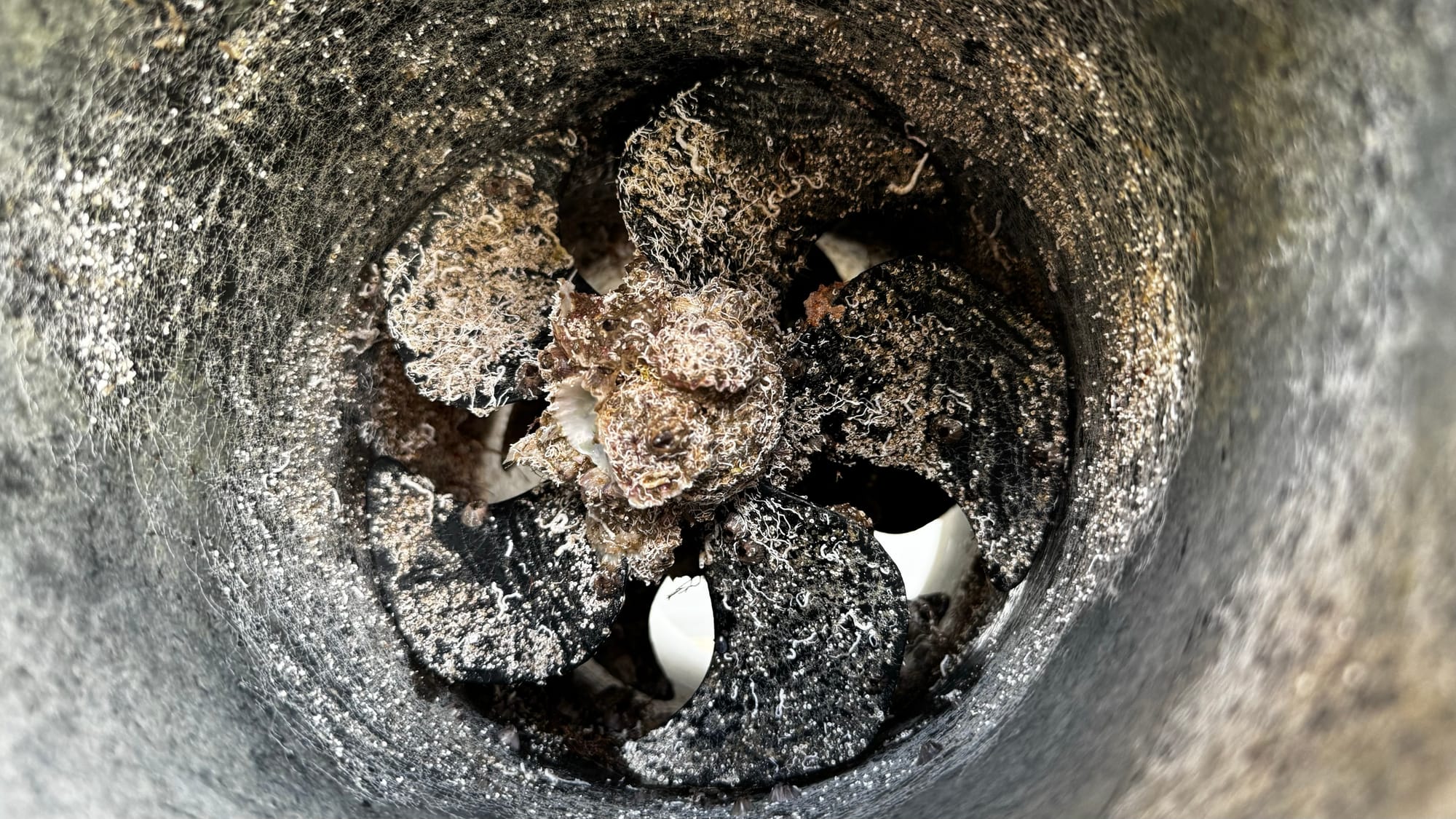
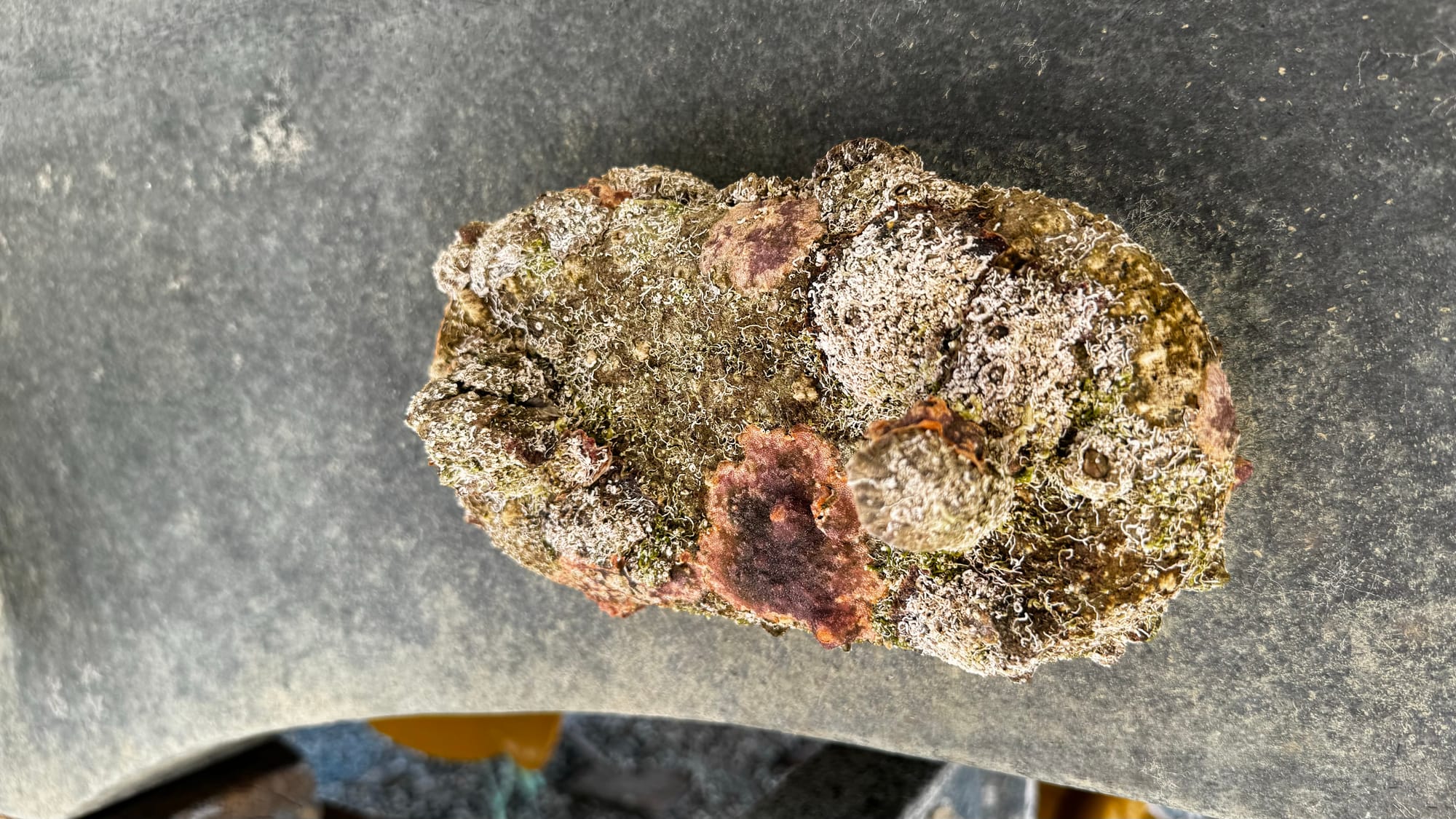
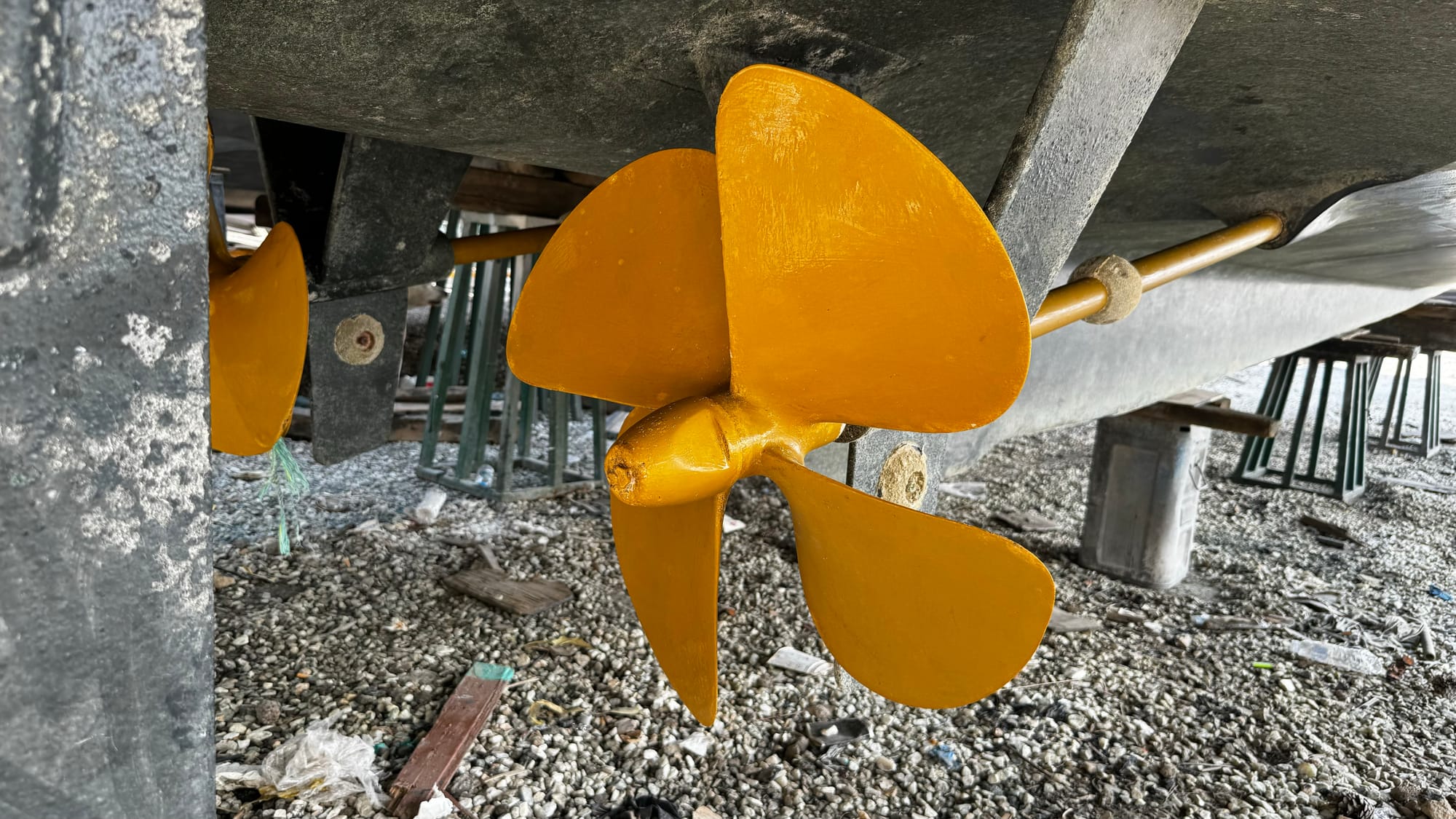
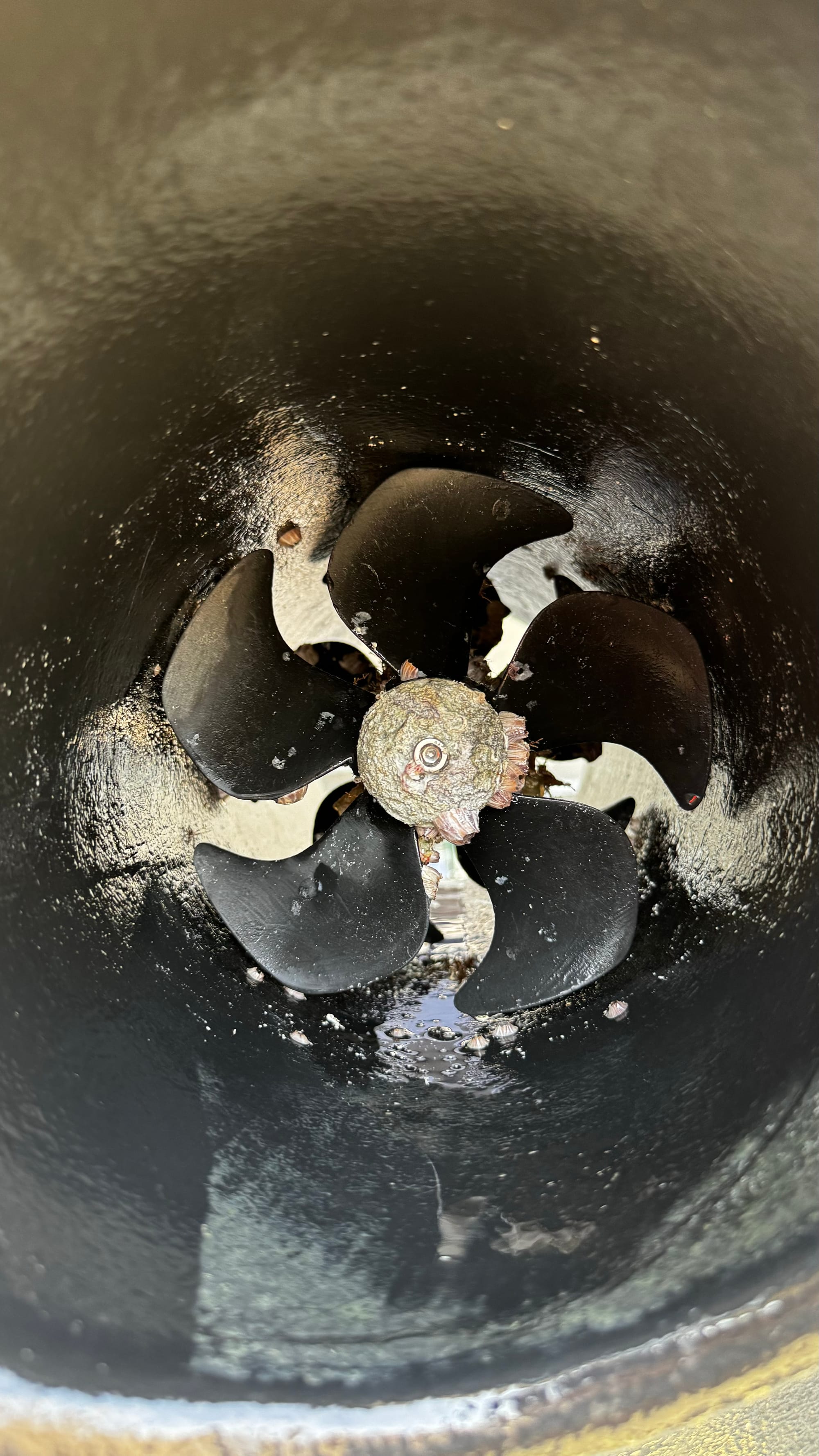
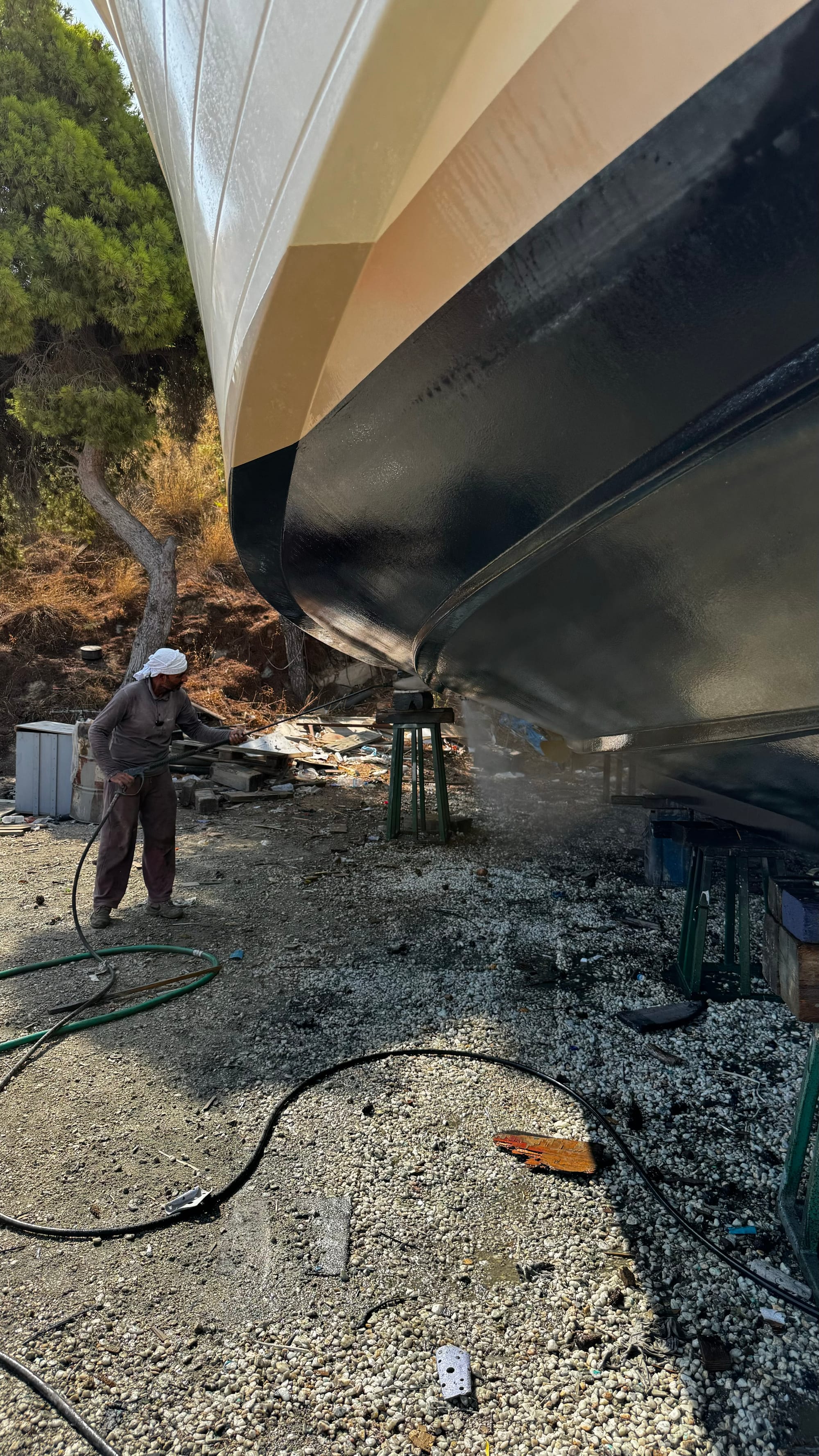

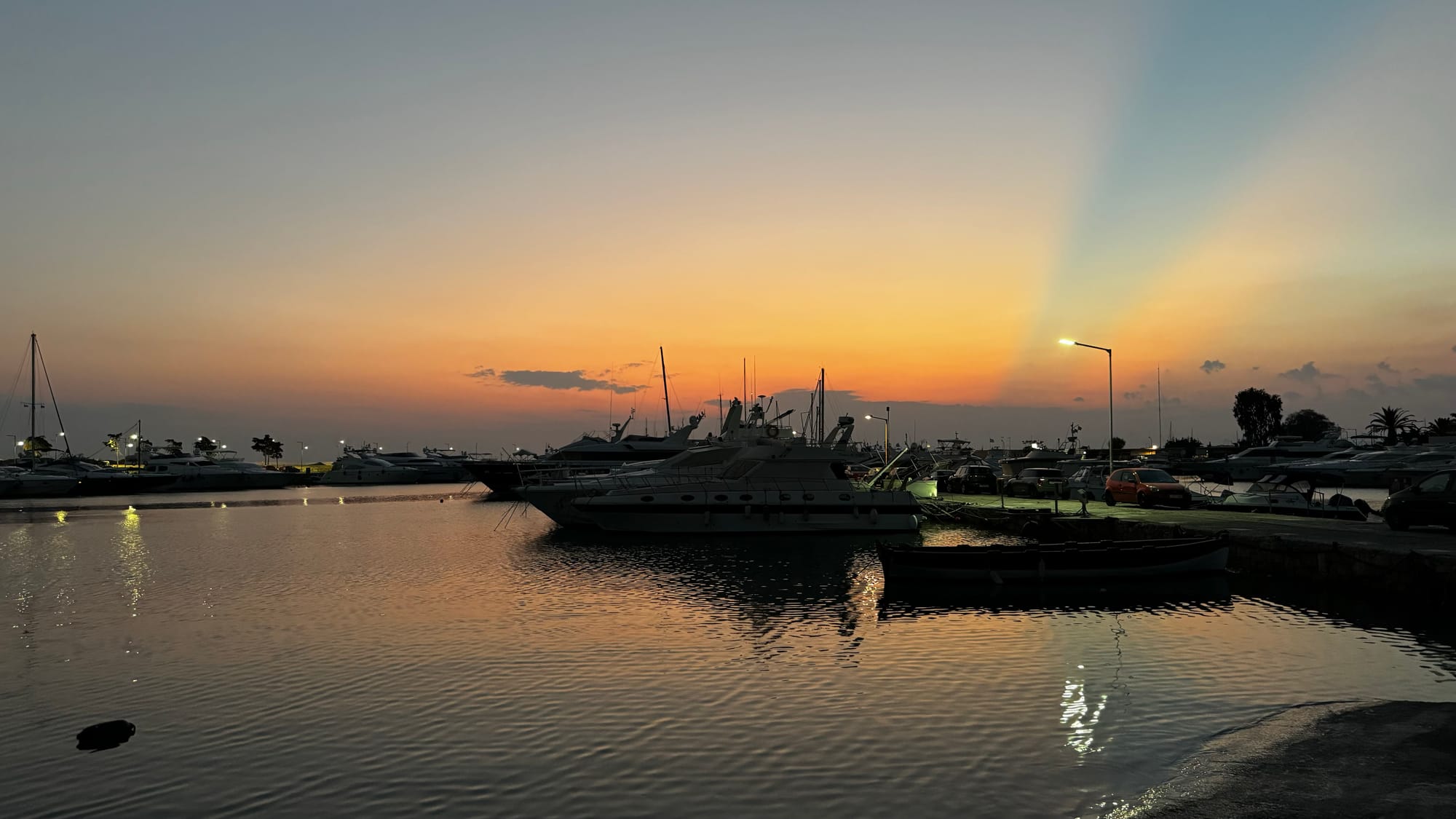
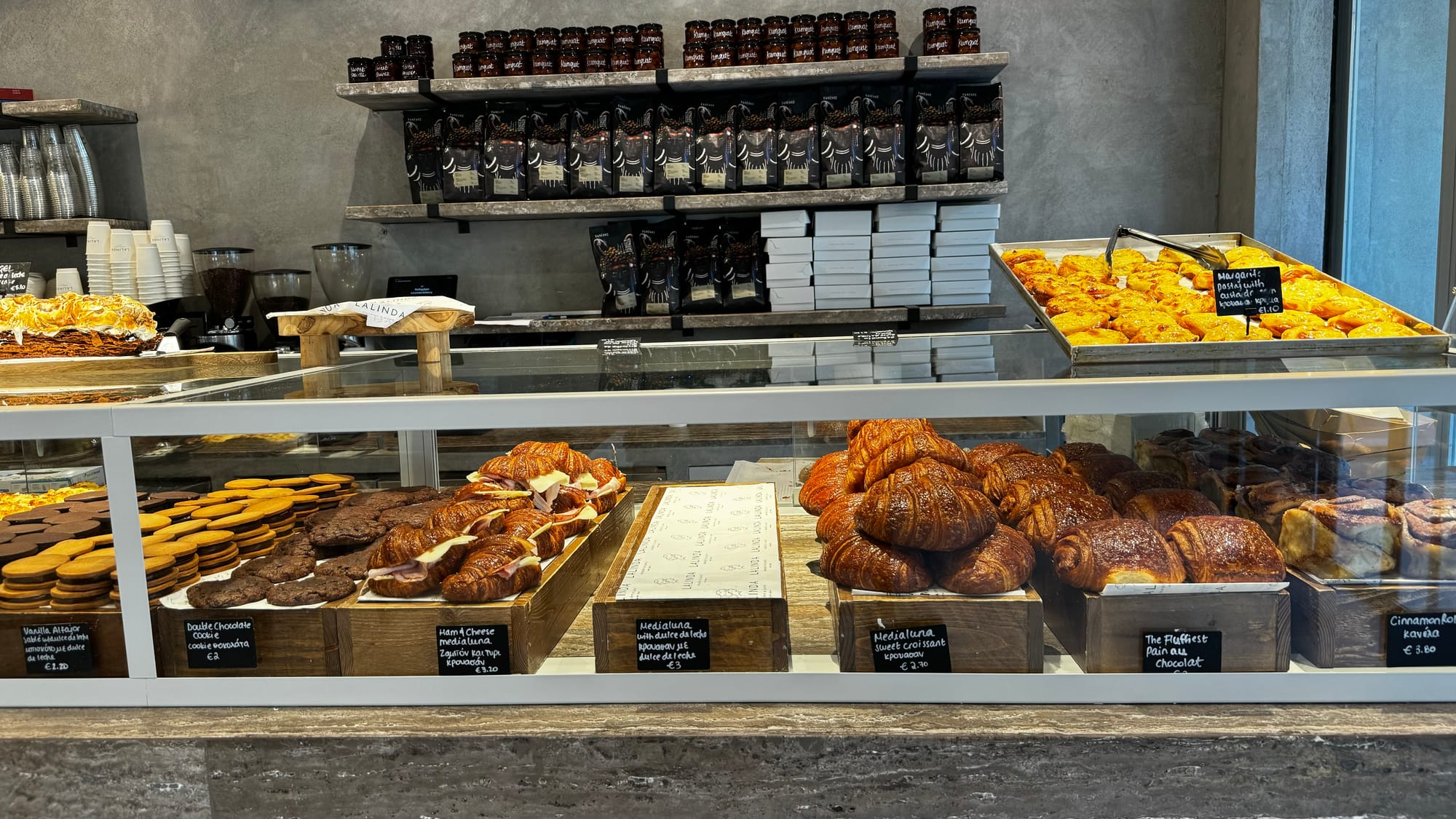
Ten months of growth, then cleaning it all off. Sunset on my last night in Athens. A decent cafe for breakfast!
At 12.30, I shed a bit of a tear, closed up Matilda, and grabbed a the cab for the airport, ready to head to our new home in Belgium. The flight home was very smooth, and then I hopped into an Uber and was home in Gent around 9 pm.
It was an epic adventure and a huge achievement I'm proud of. But I'm glad it's behind me too. It's nice to know we don't have to worry too much about Matilda now and can focus on our life here and moving to Clair de Lune from France.
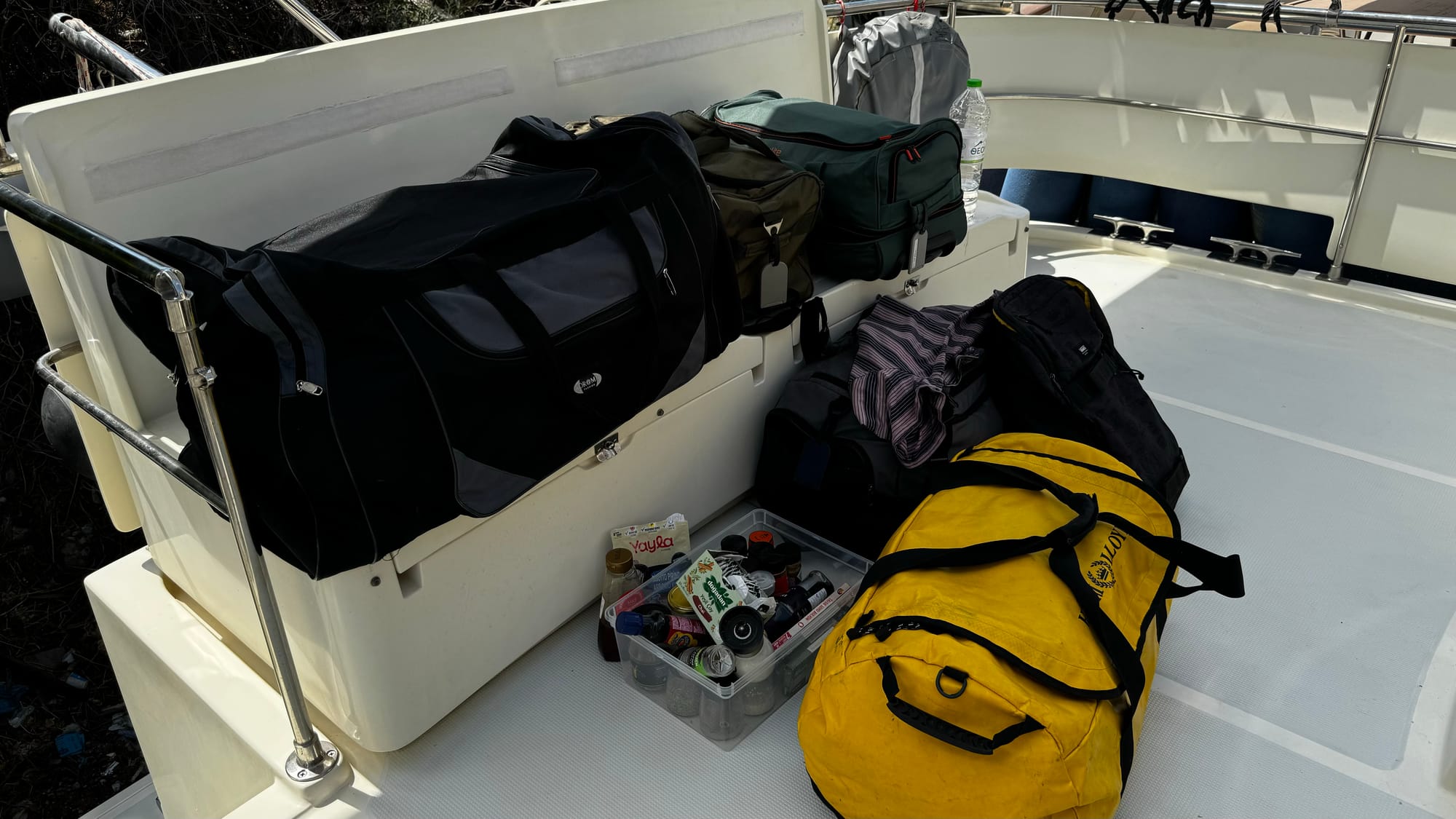
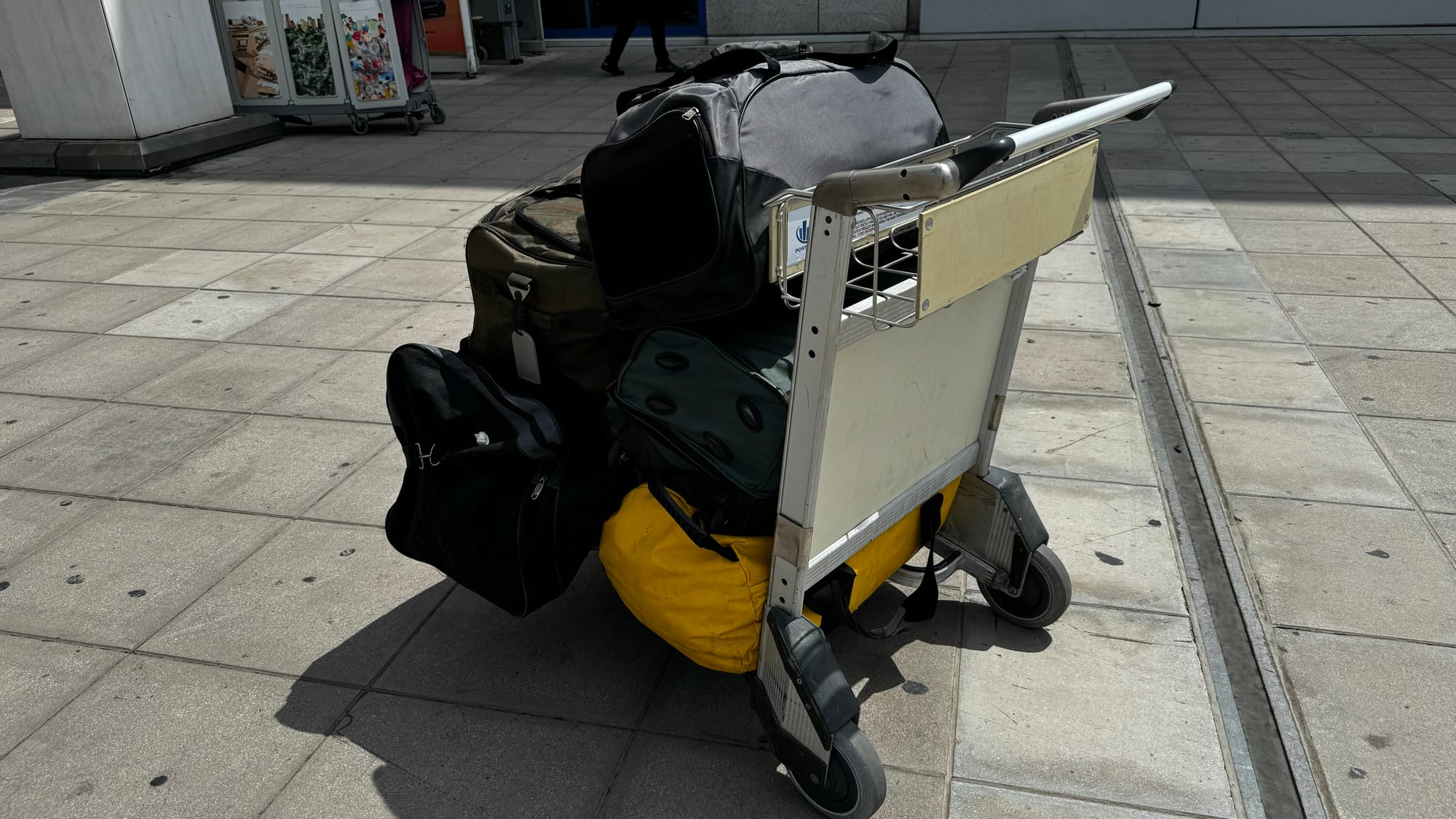
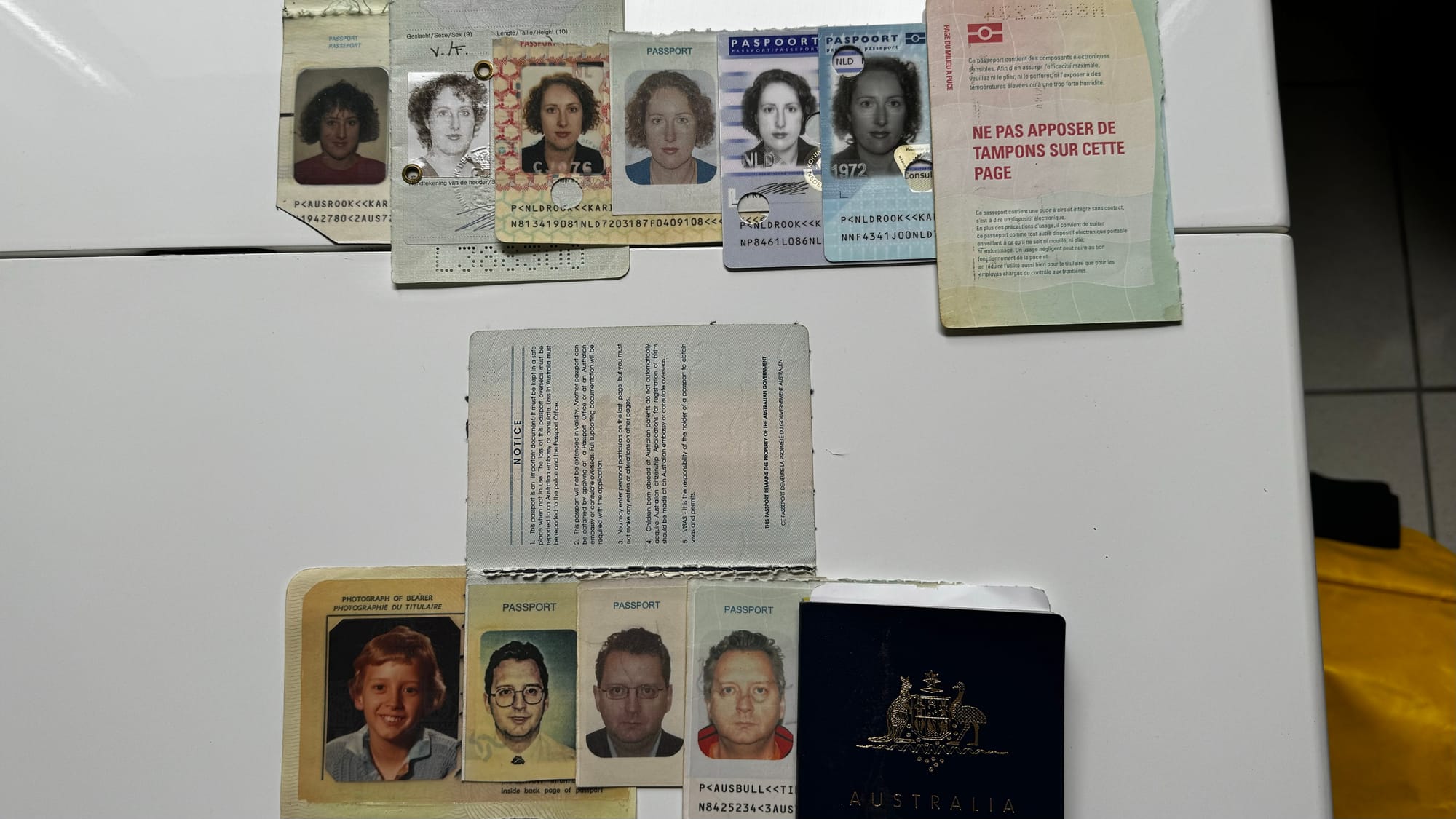
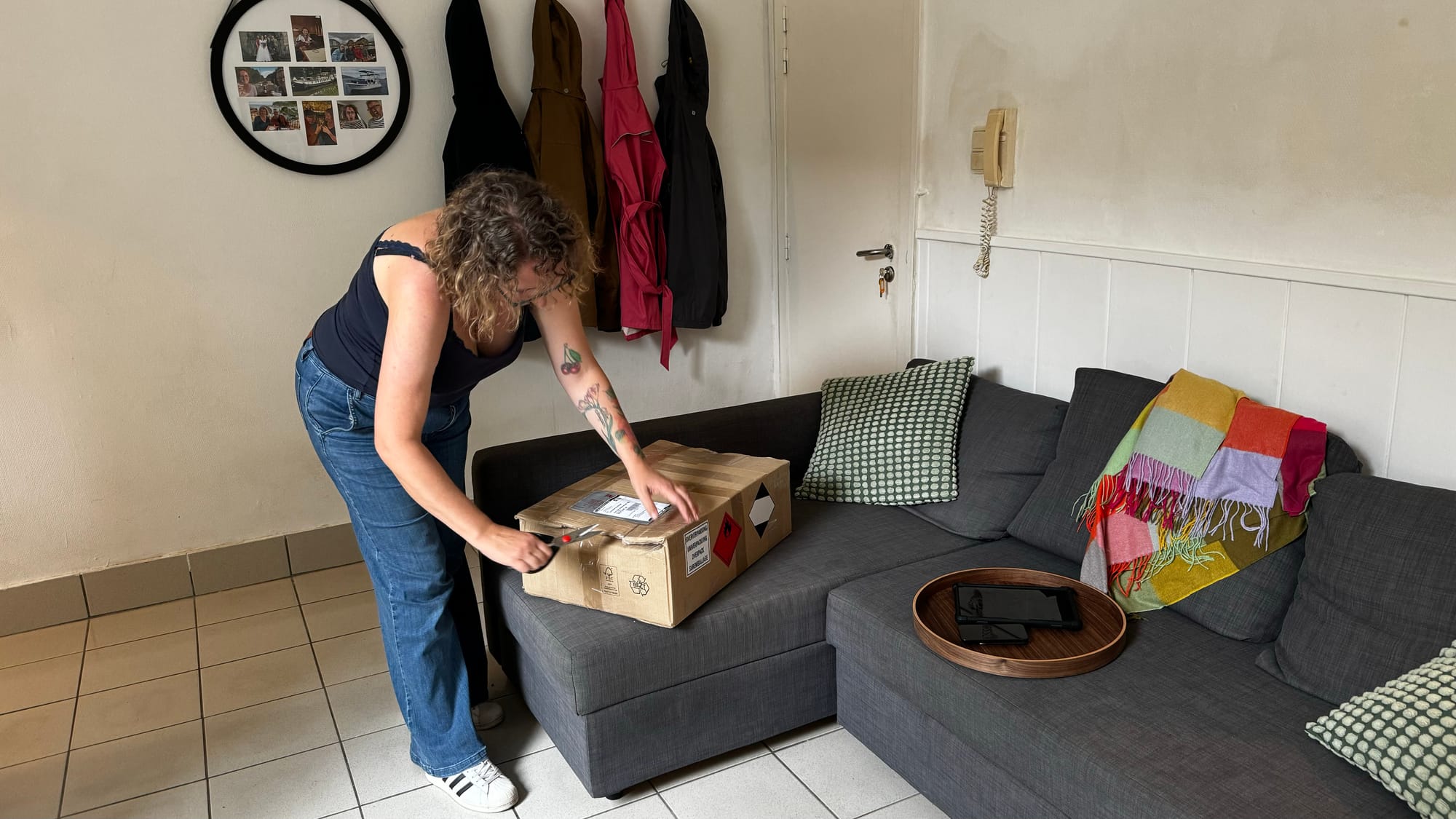
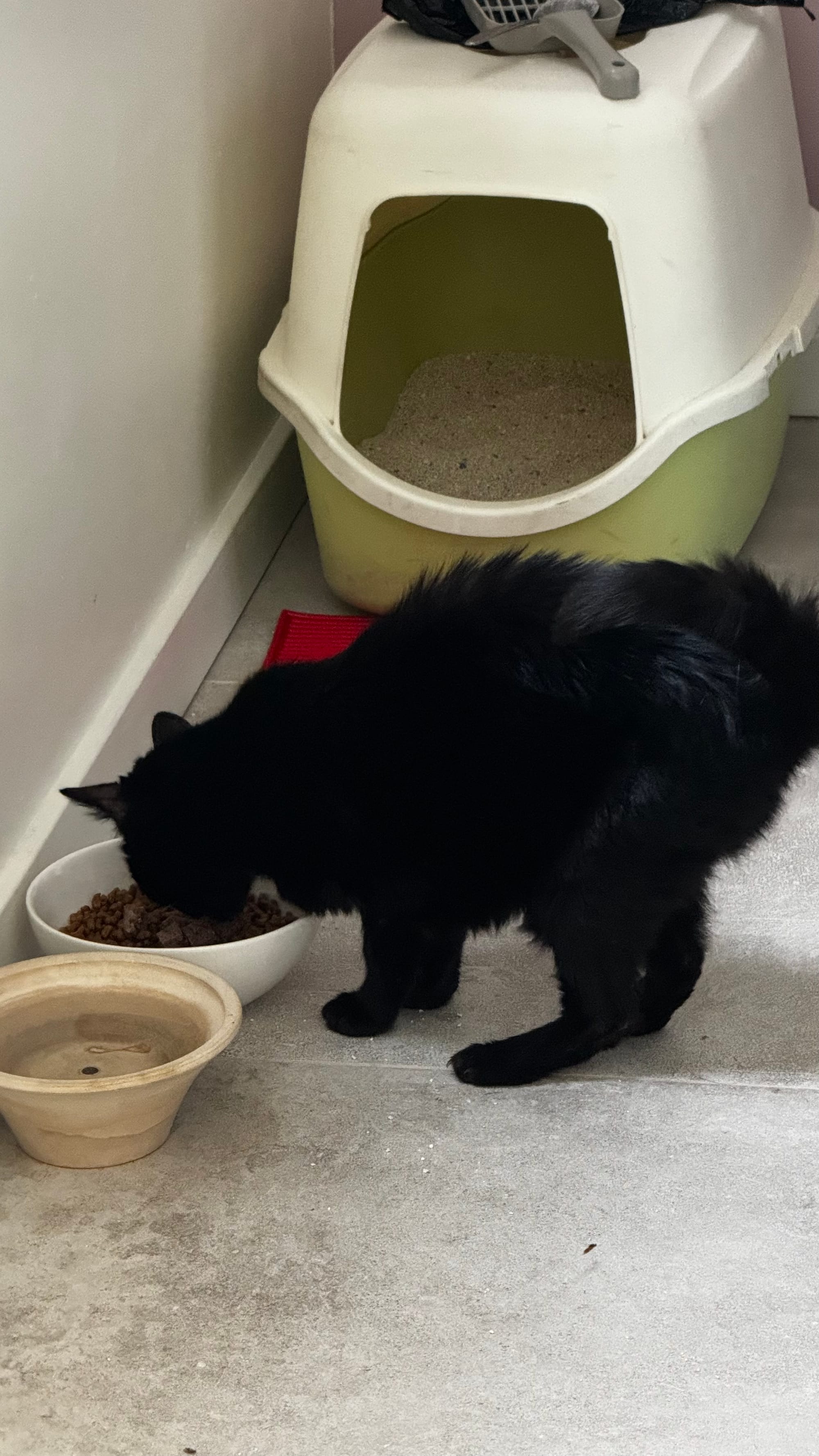
Luggage to go. Old passports to be destroyed (we've lugged them around for years and decided we no loner need them). Package of goodies for Clair. Mimi, the neighbour's 15 year old cat that Karina has been feeding.
While I was cruising by sea across half of Greece, Karina was busy, too. She kept pushing many things forward, and we now have company bank accounts, personal accounts, progress on our residency application, and a lot of essential safety equipment for Clair de Lune.
One of the critical things you need to skipper on the European Inland Waterways is an Inland Water Handling Certificate with an ICC or a national licence from a country like Belgium, Netherlands, etc. We're struggling with navigating the Belgian system, so we have decided to go to the UK and do an RYA course there, which will allow us to get an ICC (International Certificate of Competency). With this in hand, we can skipper Clair de Lune ourselves (although it is yet to be determined if it will be enough to do so commercially). Part of this is passing a written test called the CEVNI, which is all the rules of the road.
While I was in Greece, Karina studied up on this. Hence, she had a good handle on the items we needed for Clair and passed the CEVNI test with flying colours on Wednesday. I studied for it on Friday and passed it on Friday afternoon. So we're good there!
We responded to the brand people and the architects, received a quote for accountants, and, overall, most of the bits and pieces we need to do are starting to fit together.
Another highlight was that our Starlink (satellite internet) system arrived, so I had fun playing with it on Saturday afternoon, setting it up and testing it.
The Ledeberg festival is on this weekend, so we've been exploring that. We had a terrible hamburger and some quite good Olliebollen (although not as good as Karina's). We cruised the "Rommel Market" (Junk market or flea market) for some useful things like old saucepans and muffin tins and have taken a bit of a breather after a busy week for both of us.
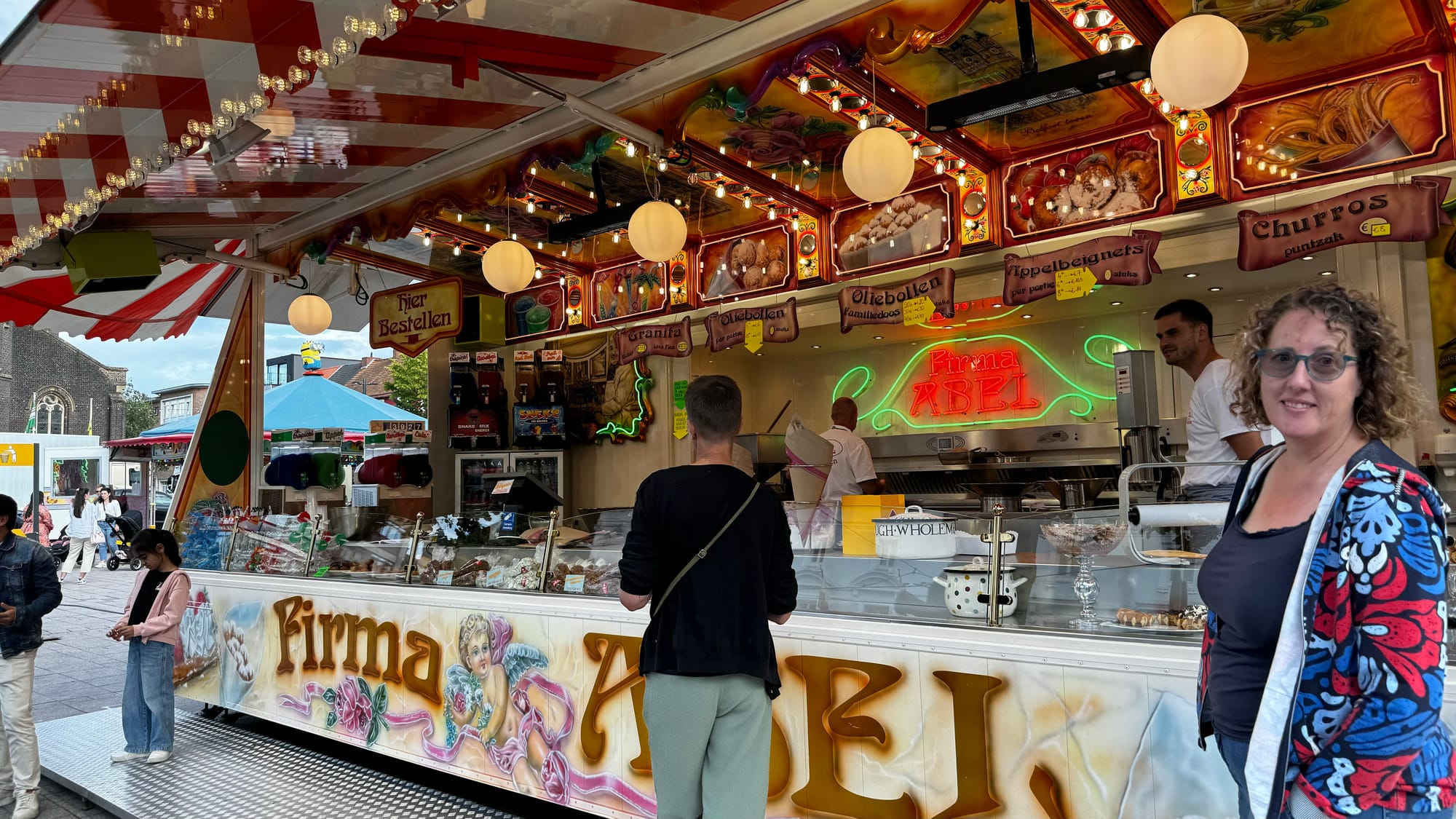
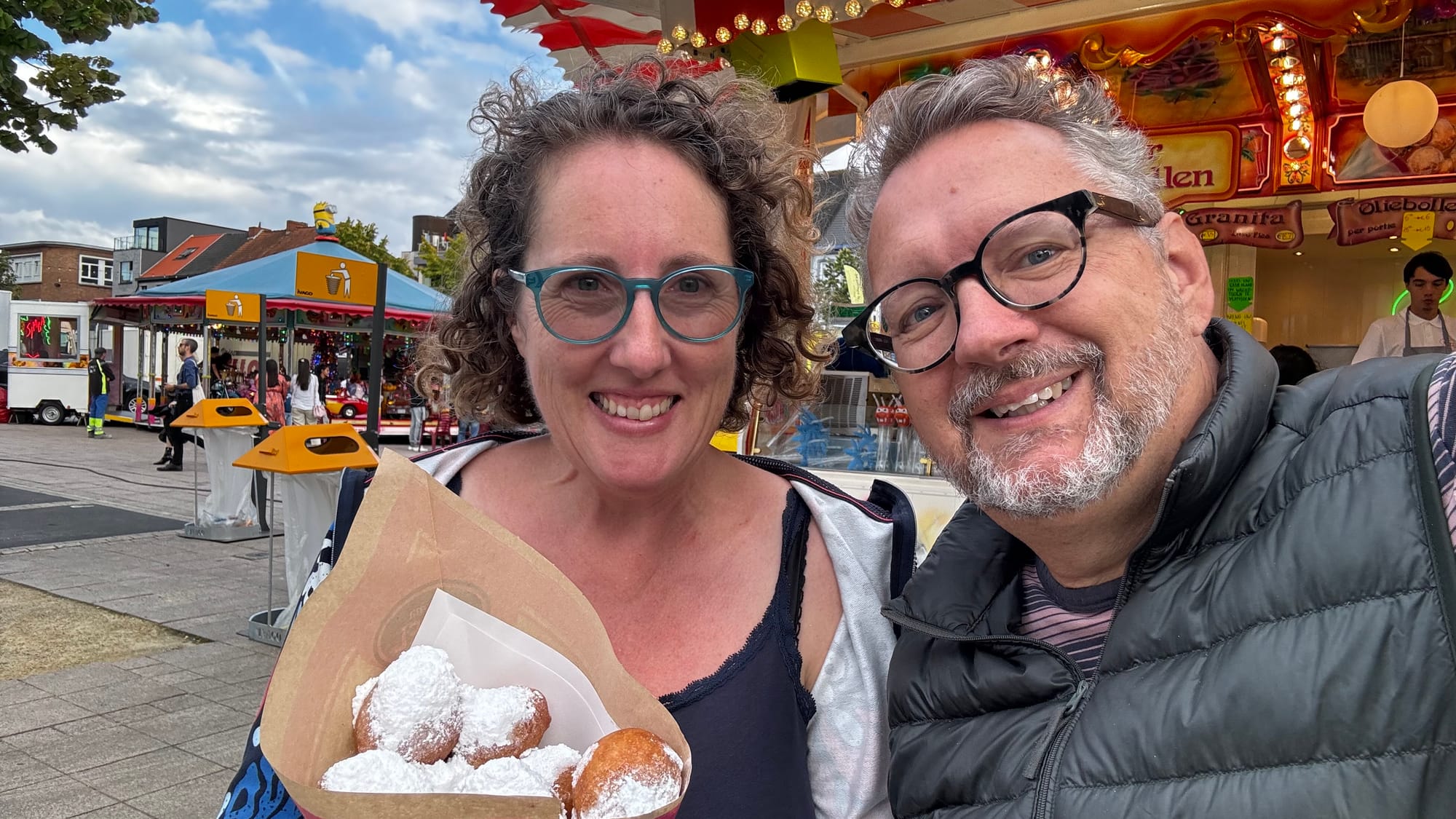

Ledeberg festival and the Olliebollen
Saturday morning, we headed for a walk into Gent to go and visit Pete, who lives on his barge in the centre there. Karina found him on the Dutch Barge Association website, and we had a lovely time chatting and learning from him about some of the quirks of barging in Belgium and living here, too. It's nice to meet new people.
Karina had drama during the week as well, the neighbour's wisteria vine brought down a drain pipe that flooded the backyard, and the landlords had to come and inspect. That will need to be fixed. Additionally, the house is riddled with dampness (something we knew), and they had contractors to look at that. Our plan to be in France for most of September seems to work for everyone; the dampness will be rectified while we are away moving Clair.
Today, we will relax and prepare to travel to the UK on Monday. It's a flying visit in and out, so we'll travel very lightly. We're hoping to bring two personal backpacks, and that's it. Come Wednesday, we should have everything we need for our ICC and can get that on a rush order so that when we return to Clair de Lune, we're ready to move her. Then, the voyage north will begin!
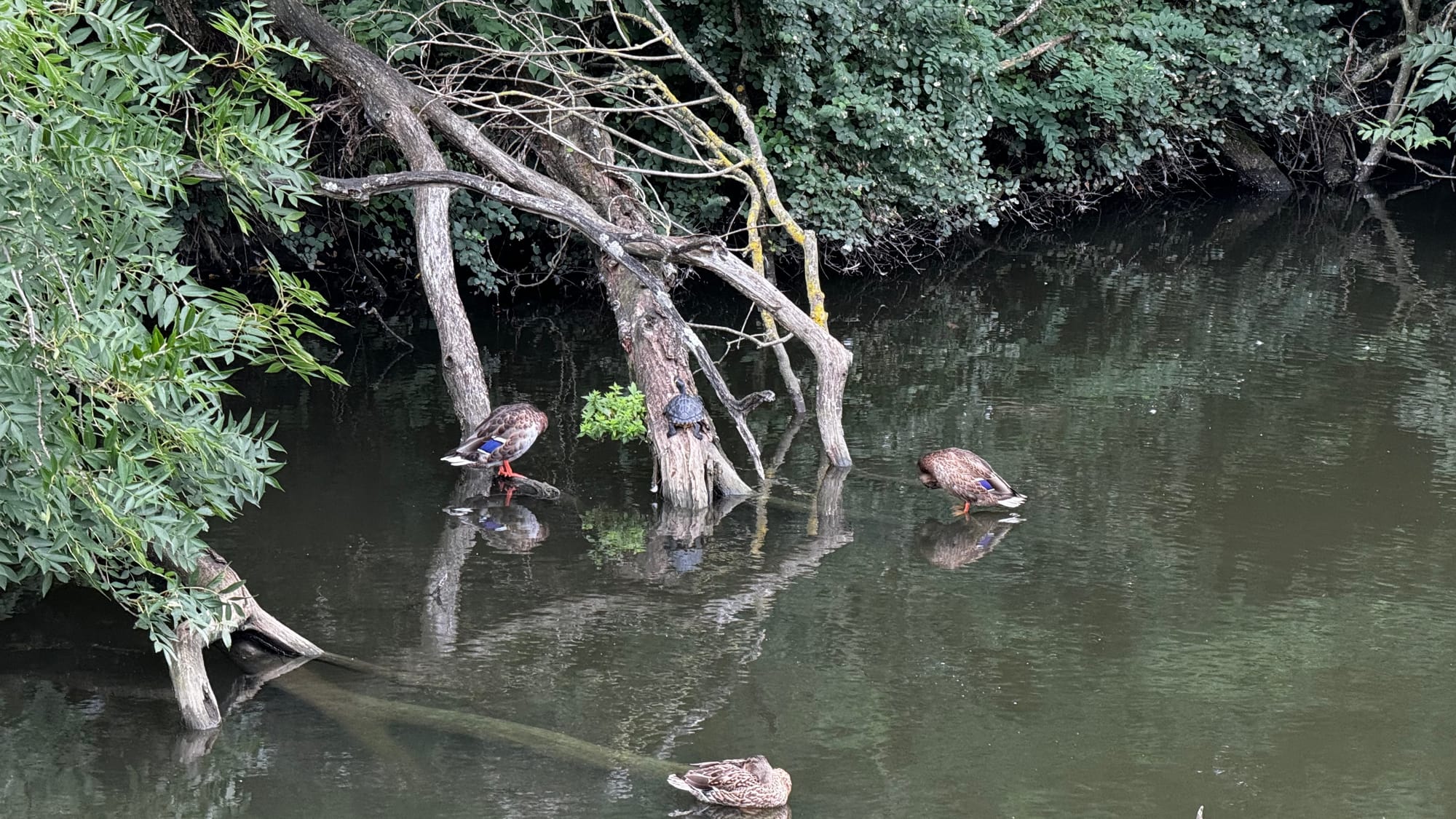
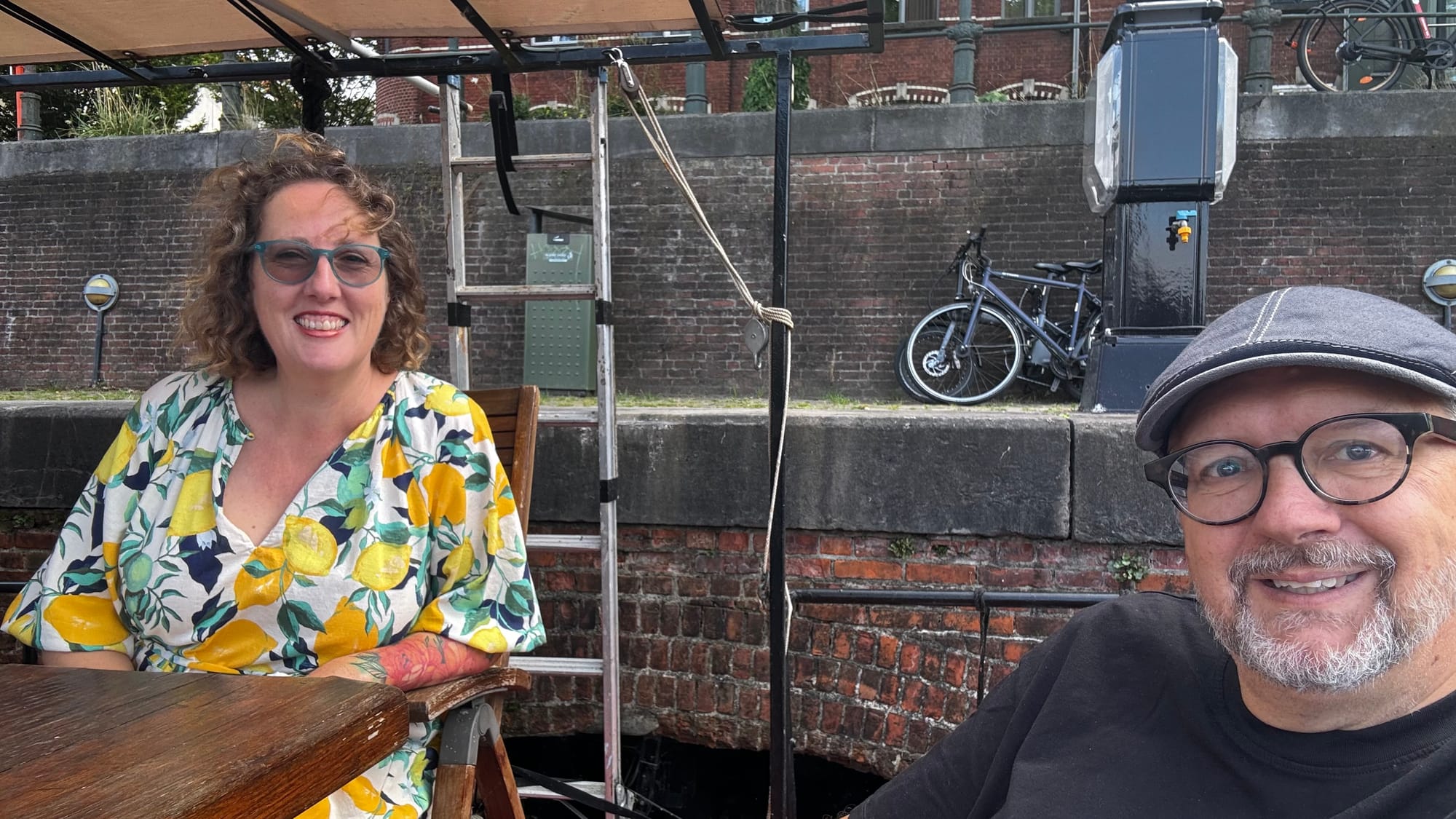
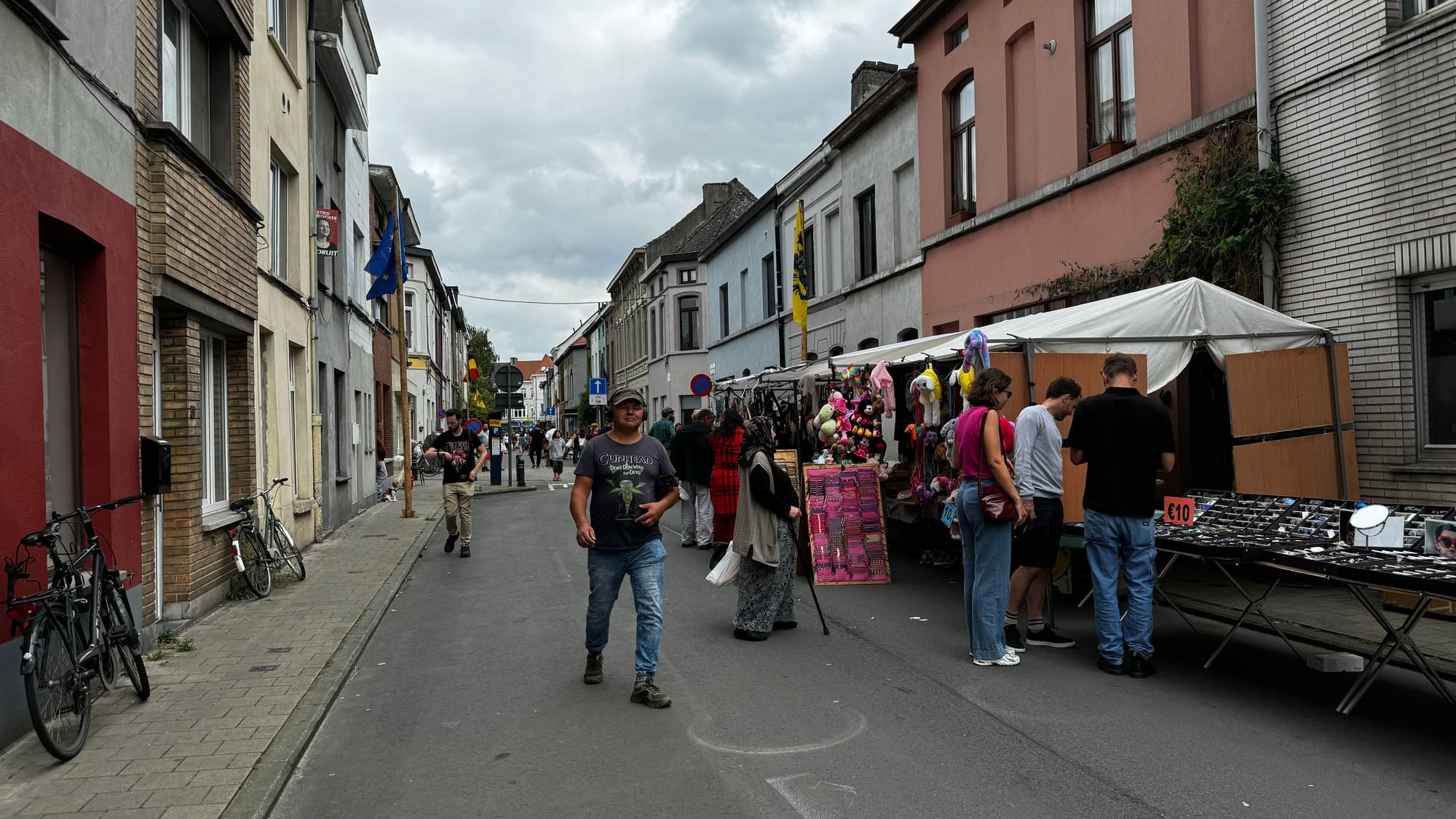
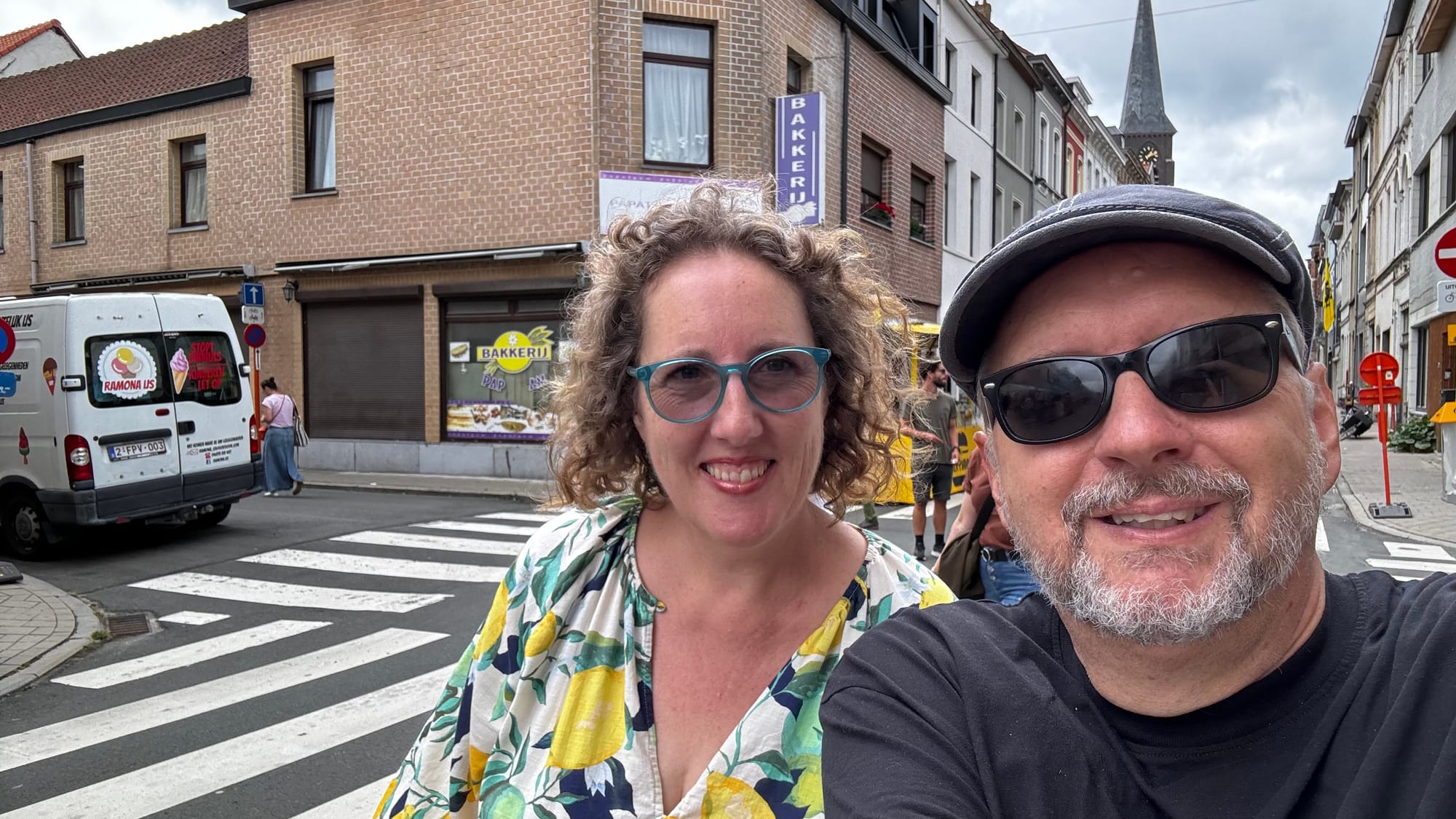
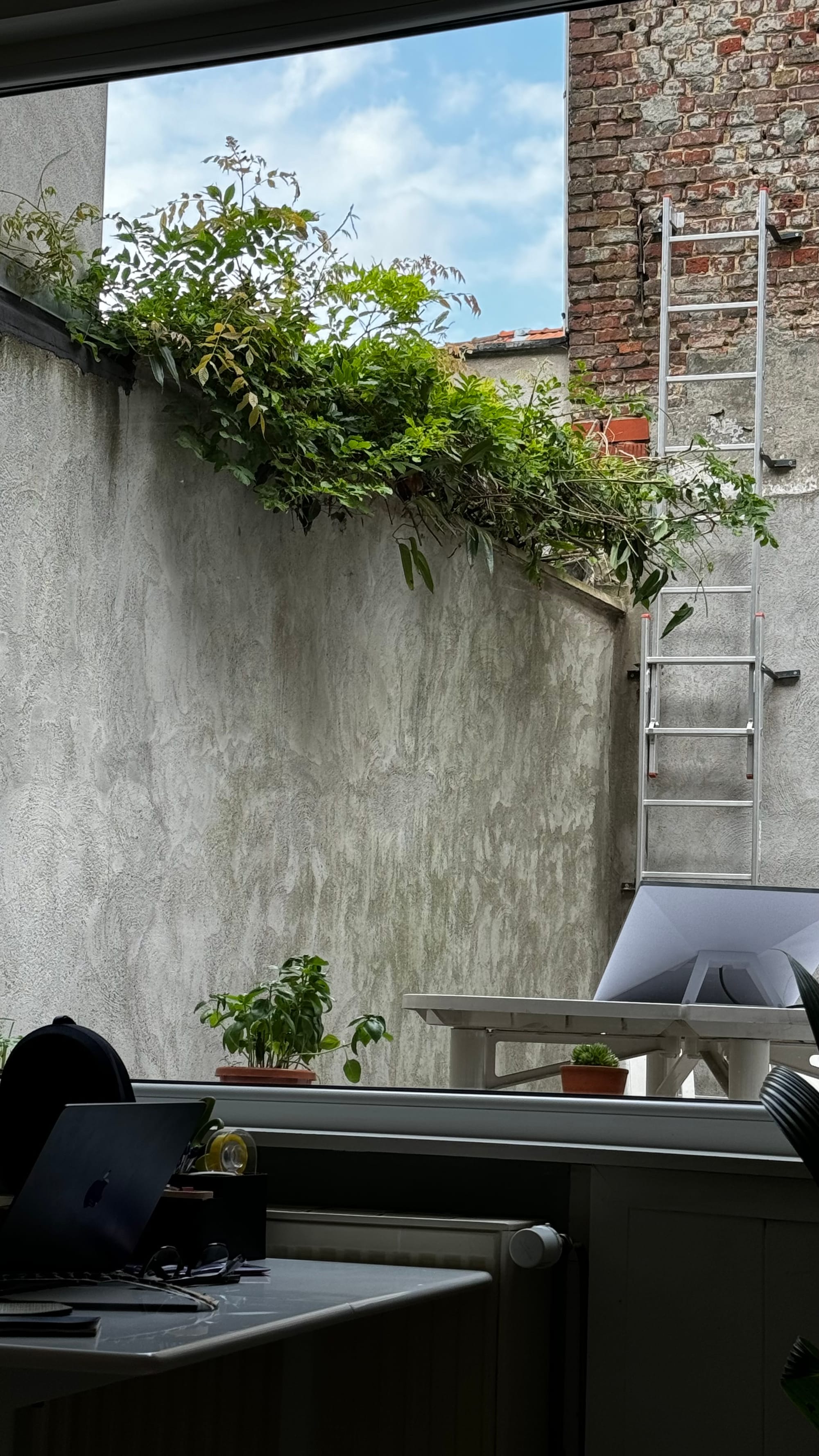
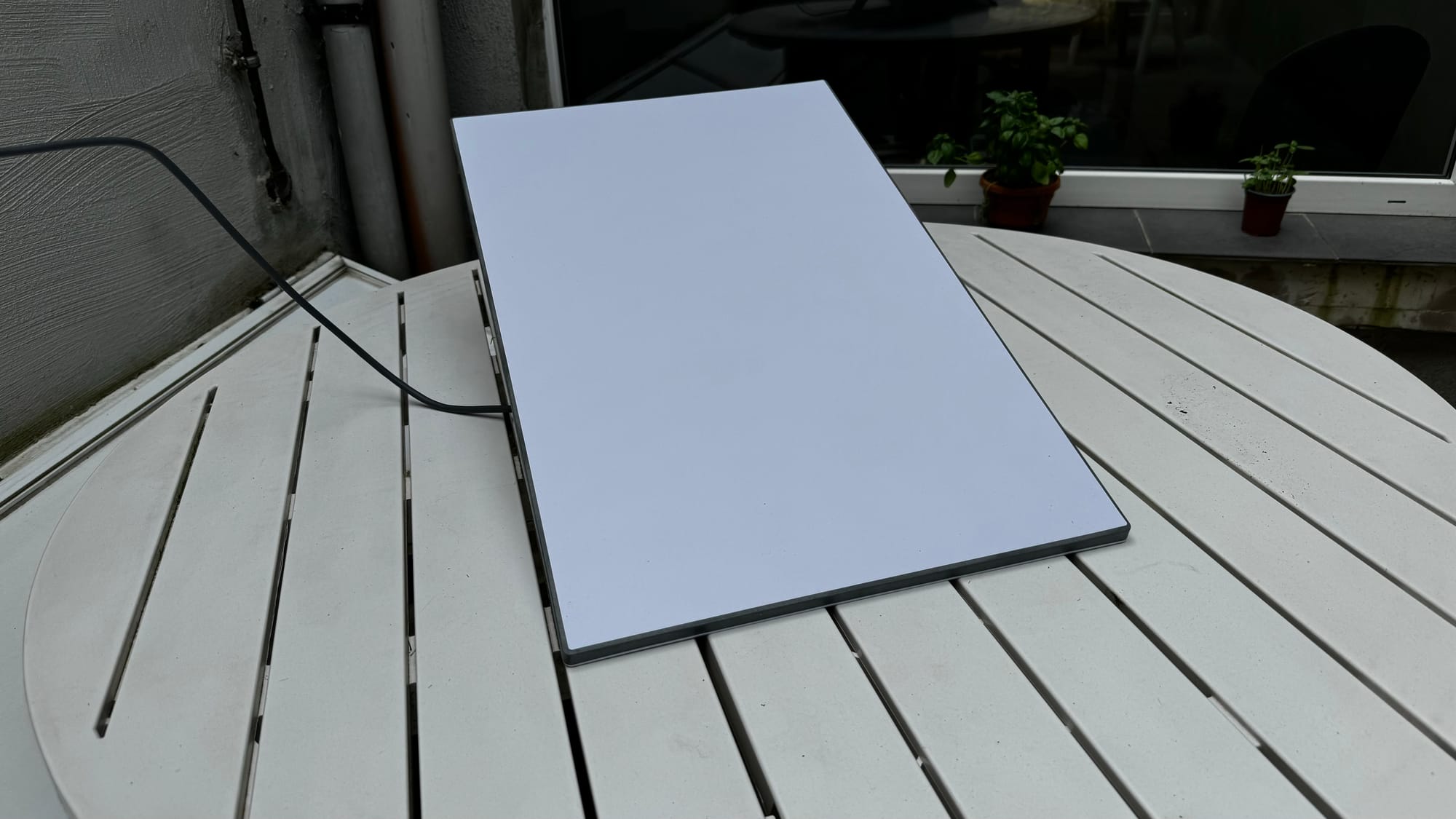
Morning walk to visit Pete on his barge. Then, the Rommel Market. Finally, playing with Starlink. Although it does work (and surprisingly well) it was upset at me that I put it in a concrete well and complained a lot about a lack of visibility to satellites (still worked though).
It's a huge relief to have the Greek part of our adventure mostly behind us now, there's so much to do as we move forward with the new challenges!
History of Clair de Lune
As a little aside, we received an update on some of the inquiries that we put out about the history of Clair de Lune. I wrote to a museum in Antwerp to see what they could help us find and they came back with some fascinating information.
Perhaps the most interesting is the "original" name for Clair de Lune of A.S. 270. This was of interest to them and they were able to find her on the register. They recognised the A.S. designation as a British operated vessel during WWI. It looks like Clair de Lune was used by the British as a supply vessel. It seems that she is a little unique, as most of these A.S. class vessels were built by the British, but Clair appears to have been "acquired" somehow.
Pete suggested that A.S. might stand for "Auxilary Support", which makes sense. The most likely role for a barge like Clair de Lune would be carrying goods via canal to near the front lines.
It's also unlikely that A.S.270 is her original name since the meetbrief starts in 1922 and the ship was built in 1907. Here's what Frederic from museeumschip.be has to say:
In the registers before 1958, they mention the ship was built in Geertruidenberg. I don’t find back the ship in the Dutch registers, so I will assume this a mistake in one the Veritas registers. On the other hand, the construction of the barge is atypical Belgian.
At some point A. Callebout from Lokeren was the owner. When he passed away in the late 50’s, his wife became the new owner. It is likely that in 1930 an engine was mounted in the ship. In the registers of 1959 they speak about a Rennes engine of 30hp. The ship was later extended to 27m and converted into a hotel barge. The last record shows a perkins engine of 130hp.
We know about the extension, but didn't know her original dimensions. When Clair de Lune was built, we can see on the register that she was 22.73m long and when the American owners refitted her as a hotel barge in 1995 she was extended by 4 meters to her current length.
Lots more to learn here and we will keep digging in the background. I've reached out to the Imperial War Museum in London now to see if they have any information or suggestions on where to research the role of the A.S. class barges during WWI.
Until next time,
Tim & Karina
